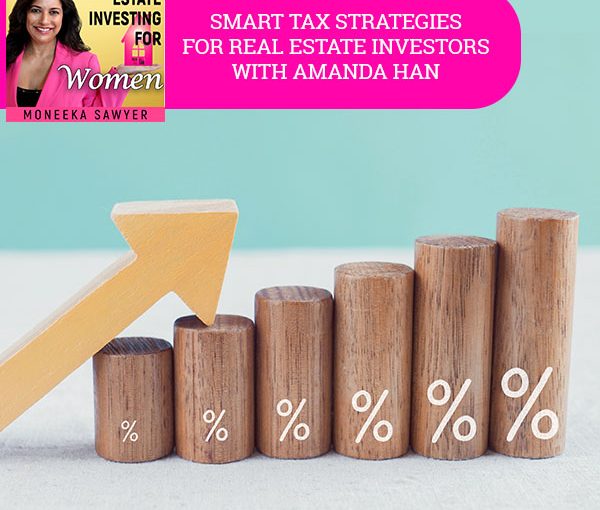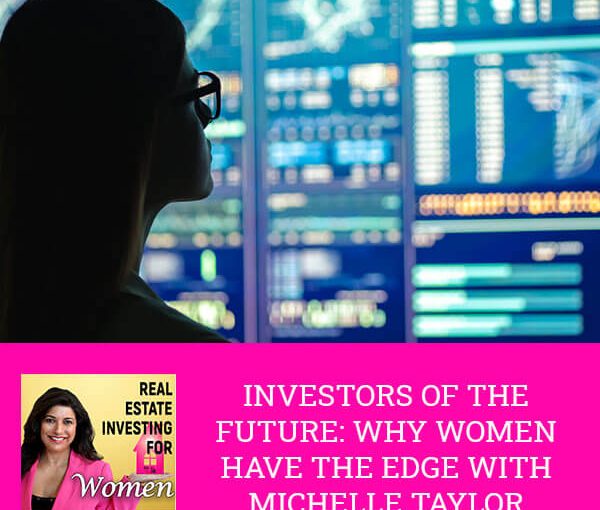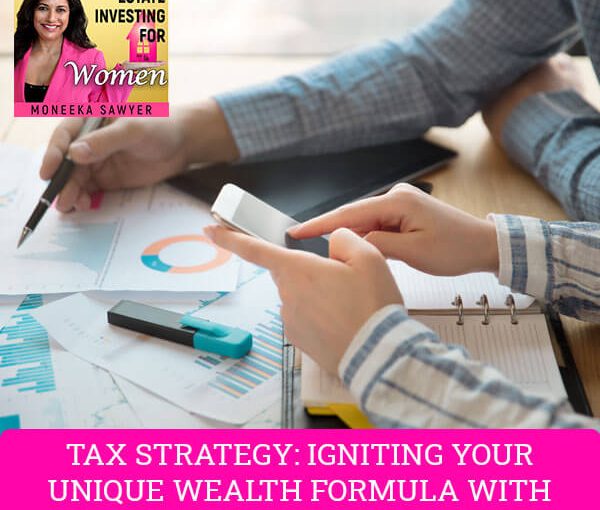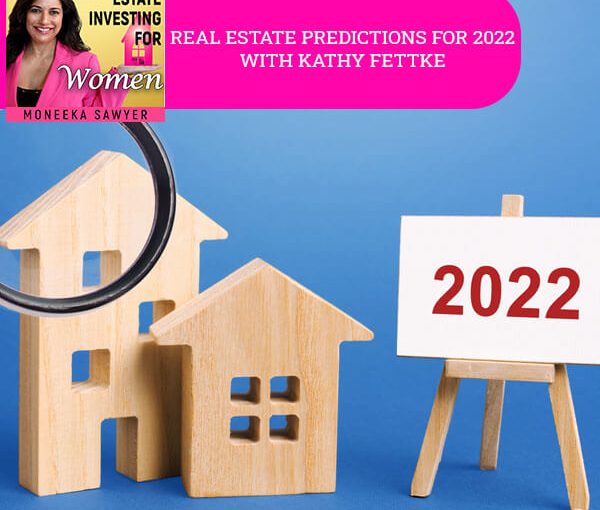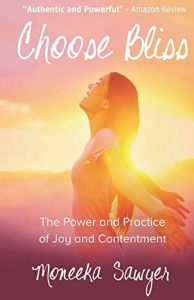Smart Tax Strategies for Real Estate Investors with Amanda Han – Real Estate Women
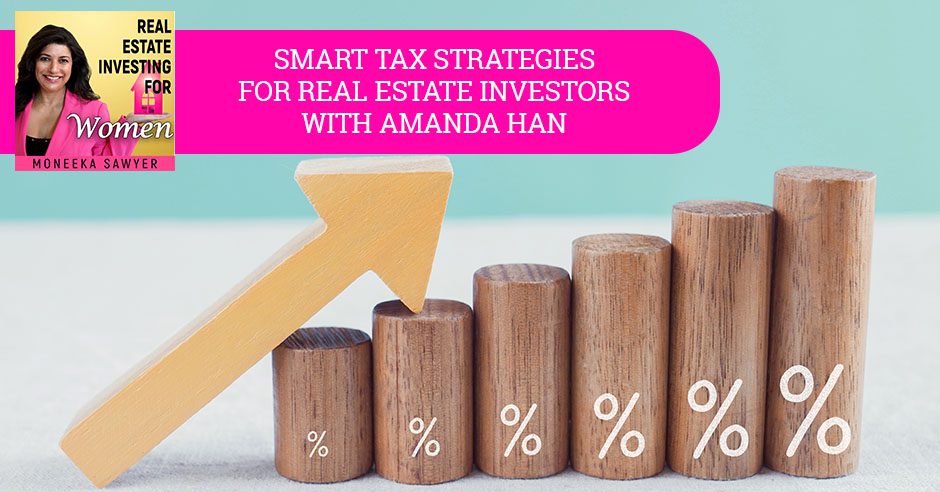
How can you recharge your wealth and scale your real estate business? Today’s guest has the smart tax strategies for you! Amanda Han has all the background she needs for real estate. Even though her family is pursuing businesses in the real estate industry, she decided to take the traditional route of studying, graduating, and landing a job. She became a CPA which helped her more in the real estate business, where she could focus on expenses and taxes. That knowledge led to successful real estate investments. In this episode, Amanda details what you could write off, especially for your taxes, to gain more savings instead of expenses.
—
Watch the episode here
Listen to the podcast here
Smart Tax Strategies for Real Estate Investors with Amanda Han – Real Estate Women
Real Estate Investing For Women
I am excited to welcome back to the show Amanda Han. Both a tax strategist and real estate investor, she helps investors with strategies designed to supercharge their wealth-building using entity structuring, self-directed IRA investing, and income offset opportunities to keep more of what they make. Amanda has a highly rated book, Tax Strategies For The Savvy Real Estate Investor, on Amazon and has been featured in prominent publications including Money Magazine, Talks at Google, CNBC’s Smart Money Talk Radio, as well as BiggerPockets podcast. Amanda, how are you?
I’m doing good. I’m excited to be back.
Thank you so much for offering to be on the show. You are always full of amazing information. I appreciate your time.
I’m excited to be back and talk about everything taxes.
You have been on the show once before, so everybody knows you. Why don’t you give us a high level of how you got into this story?
I am the third generation of real estate investors in my family. My grandparents first immigrated to the USA and invested in real estate. My parents also invested in real estate, although not full-time. My husband and I decided to invest in real estate after several years of working in a large firm in public accounting, where we helped real estate investors with their taxes. It wasn’t until I read Robert Kiyosaki’s Rich Dad Poor Dad book that I realized that’s something that I should do. My job at the time was to help real estate investors save taxes. For some reason, it never dawned on me that that was something I should be doing for myself until I read Robert’s book. That’s how we got started.
It’s fascinating because I’m a legacy investor also. My parents were immigrants and started investing in real estate. Think about that. All these immigrants are coming to the United States, and they have heard from someone else in the world that the way to build wealth in the United States is by real estate. They usually don’t have those opportunities in their own countries. They come here, buy real estate, build wealth, and do amazing things for their families, yet here in America, we’re sometimes a little bit complacent simply because we don’t know how valuable the opportunities are. We take them for granted.
It sounds like Amanda had the same experience as me like, “That was fine for you, but I don’t necessarily want to do that.” We don’t get the value of the opportunities that we have here. My dad was like, “You should get into real estate not as an agent but as an investor.” I was like, “I don’t want to do that. It’s too stressful.” It was funny that you had to get advice outside of your family.
In Robert’s book, he talks about rich dad and poor dad. Those are two different people for him. For me, it was the same because my parents and grandparents, although they did real estate, they always taught me the traditional route, which is, “Get good grades, get to a good college, get a good job.” When I got into one of the largest public accounting firms, it was like, “That’s it. I made it. I have already attained my life’s goal.” They didn’t talk to me or push me in the direction of being a real estate investor. I had to get that from someone else telling me that and then, “Maybe that’s what I should do.”
Investors are always really good about writing off things that are specific to their properties.
I had both from my parents too. They were like, “You have to go to school, get good grades, go to a good university, get a good job.” They also said, “You should be investing in real estate.” My dad had me managing some of his properties, which stressed me out so much as a kid. I was like, “I don’t want to be doing all this stuff,” but he was trying to help. We have that experience as immigrants. For our ladies who are reading this, know that these opportunities are amazing here in America. We don’t get those in other countries. I’m proud of you for tuning in to this show, but we need to take action. Taking advantage of those opportunities is the only thing that’s going to grow your life. I love that story.
When I was growing up, we lived close to my grandparents, and it was the same feeling as real estate. It wasn’t glorious to be a real estate investor. It was more of a hassle because we did our own work during tenant turnovers. I remember I was really young when my grandparents would take my cousin and me out to the properties. When people moved out, we would be there cleaning up and painting. It’s not like, “This is such a cool thing.” It’s something we didn’t want to do, but it’s different for investors now, you don’t have to be doing that stuff.
It’s not glamorous work. People meet me and they are like, “How did you do what you do?” They all think it’s glamorous. This is not glamorous. First of all, it’s the most intuitive thing on the planet. Buying a home and either living in it or letting someone else live in it is the most intuitive business. We all need housing. I do still manage my property. I’m not into painting but I’m hiring somebody. I’m still vetting out my people. It’s not glamorous. What is glamorous is the levels of money that I made and the wealth that I built working for a few hours. Even though I might be there 4, 5 or 10 hours during a turnover, what do I get for that?
I love this conversation because this is important for us to point out. Every job has its glamour factor and the grunge work that has to happen as a tax consultant. Amanda is this beautiful woman with a beautiful voice. She’s running this company. She’s wealthy. She invests in real estate. She’s very successful. There’s a level of glamour around that. She’s still the one that’s punching numbers. That is the non-glamorous piece. Everything that we do in the world is going to have like, “This is awesome,” and “This is the thing that we have to do to make it happen.” Keep that in mind as you think about all these things you would have to do in real estate. First of all, you don’t have to do all those things but no matter what you’re doing, you have to do both sides.

Tax Strategies: Getting into one of the largest public accounting firms is an attainment of a life’s goal.
You still wash dishes together, clean the floors, and wipe your babies’ butt when they poop. You do all of those things. There’s the beauty, glamor, romance, and the living life piece. That’s true for everything that we do. Sorry to belabor this but I feel like some ladies need to know it. They want to do the things that are cool but they don’t understand. Not just ladies, this is for everybody. As you are learning something new, you have to do those other things to make the glamorous end result you are looking for. It doesn’t have to be painful, unhappy or any of that, but it’s part of the course. You’re going to need to do things that don’t feel glamorous.
As it relates to the tax side of things, not for me as a CPA but just for investors, a lot of times, people who either hear me speak on a platform like this or read one of our books will say, “I love hearing the stories about how people saved $10,000 or $50,000 in taxes. I want to do that. Does it happen automatically? I read the book, and now I’m going to expect that to happen.” It doesn’t happen that way. The story is the glamour of this is what happened, but what you’re not seeing or paying attention to is what did that investor do during the year so that by next April, when they’re meeting with their tax person, they have everything in place so they can get the tax savings.
Let’s talk about investing and taxes. What can you write off as an investor? Give us some ideas.
When it comes to write-offs, the IRS sees investors as business owners. By business owners, I don’t mean you have to go out and get an LLC, a corporation or anything like that. I mean that you are in the business of investing in real estate. Whether you are a landlord who’s getting rental income, you are in the real estate business. If you are a flipper, wholesaler or even a realtor and you are making money in those activities, you are in the real estate business. You hear people talk about things when they say, “Business owners get all these incentives, loopholes and benefits,” but the vast majority of those write-offs are also available to us as real estate investors because we are business owners. Investors are always good about writing off things that are specific to their properties.
Let’s say you’re a landlord, most people don’t forget to write off their mortgage interest. There’s a lot of money they are paying into the bank, so they are not going to forget that or property taxes you paid to the county, maybe even paying your property manager to manage properties or repairs. People are usually pretty good about those expenses and not missing out on them. What I find that a lot of people miss out on is what we consider overhead expenses. These are expenses you are spending for your real estate business that are not necessarily specific to a property.
Maybe you bought a membership to be in a club or a group like a women’s group or something, or a tax book to learn how to invest in real estate and save taxes. You are driving your car for real estate purposes. Most of us probably use our cell phones, laptops, and all that for real estate. Even though these are things that are not specific to any property, they are for your real estate business as a whole. It’s important to make sure that as an investor, we are tracking and writing off those expenses. We’re all in agreement that tax rates are not going down. If anything, they will stay the same but possibly go up.
As those tax rates go up and you have $100 worth of expenses and save $20 or $30 in taxes, that’s pretty significant. $100 might not seem like a lot but if you are tracking all those throughout the year, then you are talking maybe a couple of thousand dollars or tens of thousands of dollars. That’s when the savings could be significant that you might save enough money for a down payment on another rental property next year.
I love that last piece where you said, “What if instead of paying taxes, we were buying another rental property?” Understand that Amanda and I are not advocating and doing anything that is not legal, but these are things that are legally accessible by us if we pay attention and prep a little bit. It’s never been positioned that way where you could take the money you are not paying in taxes, get a refund or however that shows up, and then turn it into another rental property and opportunity for cashflow.
Let’s say it was $10,000 we paid in taxes. We know what the return on investment is. It is $0.
We got nothing. We get the stuff that the government gives us but we don’t have it personally.
It’s not a surprise that, as real estate investors, we can save on taxes.
If you instead had $10,000 more to invest as a down payment, that could be $50,000 worth of real estate. That could be small property or at least a part of a property. If you do that year after year, they could supercharge how quickly we build our portfolio. A lot of real estate investors I meet oftentimes will say, “I want to get into real estate but I don’t have money to invest. How do we get bank financing? How do I get investors’ money? How do I partner with other people?” Although those are all great ideas and things we need to use as an investor, why not look in our own pockets first? It’s like, “This is the money I’m making. If I can keep more of my earnings, then I already have more money to invest. I don’t have to worry so much as to where am I going to find the money for my next deal.”
Especially for a down payment, you can use that money to invest in another deal. You could also use that money to do a partial or a down payment for several properties or one property in a nicer area. You can make different choices about the business you want to run.
People don’t look at it that way. They are like, “I don’t want to pay the IRS. I’m going to save money.” I have met people who are like, “I got a big refund, now I’m going to go on vacation with that. I’m going to buy something personal.” That’s not the goal. If you save the money and use it to invest in real estate, that new property will give you more write-offs for next year. It’s a compounding effect of saving and investing more so that you can save more and invest more.
Along the way, you are going to be enjoying that cashflow which would be supplementing, and you can partially reinvest that into your business. You deserved that vacation but it is a mindset switch. Amanda and I had the pleasure of meeting in San Diego. We had a boss lady weekend. I met with all these amazing women that are investors in real estate or some iteration. They do something around the real estate investor thing. It was funny because we all carried nice purses. I’m not a purse person, but we had our nice clothes or purses.
We all drive nice cars and have nice homes. Amanda talked about the tents that her kids built right in their cute bedrooms. We have got nice lives. We had met another woman and she was a friend of ours. She had bought a $50,000 ring. That’s certainly her right. If that’s what lights her up and she loves that, that’s awesome. All of us had the reaction of, “That’s another house.”
I love jewelry. My husband bought me another $6,000 ring for our 25th wedding anniversary, but that’s a house. It is a mindset of you should enjoy your life and have things that you love and make you happy, but understand that it’s balancing between our businesses and those things that we think are going to make us happy. We do need our vacations. I’m a choose-bliss person. A big part of bliss is about loving the journey and vacation is a big piece of that, but you should balance that. Use some of that money for investing. If it’s tax-saving money, that is business money. Business money should be reinvested. You can decide.

Tax Strategies: $100 dollars might not seem like a lot, but if you are tracking all those throughout the year, then you’re talking maybe a couple thousand dollars or tens of thousands of dollars.
It’s making that conscious decision and being honest with yourself in terms of what you are doing. Sometimes I’ll meet people who say, “I want to get into real estate investing. I hear all these great things about cashflow, appreciation, and tax savings.” By the next time I see them, they are like, “I was looking at real estate, and then I bought this nice big home for myself. I decide to upgrade. This is like an investment.” It’s being honest with yourself in that, “I didn’t end up buying an investment property. I ended up buying something nice for myself and my family.”
There’s nothing wrong with that, but understanding that the nice large home that you bought is not giving you cashflow. It’s not giving you an additional tax write-off because it’s not a business. It is by understanding the differences between every financial decision you are making, whether that’s more for personal enjoyment or true investment and growing your portfolio.
Do you need an LLC in order to save on taxes?
It piggybacks off of your first question, “What can you write off?” A lot of investors are under the assumption that in order to write-off anything, you have to have an LLC or you have to pay for it from your LLC. That’s not true at all. What I was saying is as real estate investors, we are business owners in the eyes of the IRS. The definition of business is not LLC, S corp, C corp or any of that. It’s whether you are investing in real estate. We have a lot of investors who are landlords who don’t have LLCs. For one reason or another, they choose the whole rentals in their own name, in the trust or something like that.
They can still write off all those same expenses we talked about, a car, home office, cellphone and travel. All those things are tax-deductible. It’s a common myth that people feel like, “I don’t have an LLC yet. Let me go ahead and form an LLC so I can take these deductions,” when more than 90% of the time, those normal expenses can be deducted regardless of whether you have an LLC or if you operate in your personal name. When it comes to taxes, we break it out into two different groups like if you have rental income. That will be rental from single-family, multifamily, commercial, all types of rental income versus the other bucket, which is more active income. Active income will be if you are a realtor, a wholesaler or a fix and flipper.
The reason we have those two different buckets is because taxes are treated differently for those two different types of income. For most landlords with rental income, it doesn’t matter from the tax side whether you have an LLC or not because you don’t pay self-employment taxes. You can write off the same things. For landlords, the reasons for having an LLC would not be for tax. It’s mostly for asset protection purposes. Your attorney might say, “You don’t want to lose all your assets because one of your tenants sue. Let’s put that in an LLC or a partnership to get the liability protection.”
On the other hand, for active income flipping wholesaling, you also have to pay self-employment taxes. Not only do you pay federal and state income taxes, but you are also paying into Social Security and Medicare. That’s another up to 15% tax. That’s where having an LLC or S corporation could help minimize those. It’s difficult to say if you should have an LLC or not, and that investment number two should have one. That’s all based on your unique situation. How much money do you make in real estate? How much other income do you have from a job or a business? That’s something that you want to plan out with your tax person.
For someone who has active income, let’s say you have $100,000 of taxable profit from flipping, wholesaling or as a realtor, if you run it through an S corporation or something similar, you might save up to $7,000 in taxes with the structuring. That’s where it typically makes sense to have an entity. In either situation, you can always write off the same things regardless of whether you have an entity or not.
I loved the clarity on the two different ways that work and how the IRS looks at that. What would you say are the biggest mistakes that real estate investors make when it comes to taxes?
There were quite a few of them. We are talking about entity structuring. There are two big mistakes on the entity structuring side. One is using entity structuring almost as an excuse to delay investing. This is more for newer investors because I do hear this quite a bit like, “I’m going to invest in something,” and then a couple of months later, they will tell me, “I have not invested yet. I could not decide on a name for my LLC.” That’s an excuse to say, “I didn’t do it because I don’t have an LLC yet.” One way to overcome that is to understand you don’t have to have an LLC to buy rental properties. Even if you bought a property now, you can always move the title into an LLC after the fact. We don’t have to worry about that. For a lot of the women investors, it is more of we have to find that perfect name like Blissful Real Estate, LLC.
People get caught up in all that instead of focusing on taking action and doing real estate. The other most common mistake on the entity side is forming the wrong type of entity. That’s one of those things that if you form the wrong entity to hold your real estate and don’t find out until way later that you were in the wrong entity, it becomes very costly to unwind that.
We have seen clients who had owned real estate inside of S corporations for 5 to 10 years. It’s very difficult for them to unwind it because now the property has appreciated. The only way to unwind it is to pay a lot of tax to get it out of the entity’s name into the correct entity. There’s a fine line between not waiting too long to form it, but then also forming it correctly from the start, so you don’t have such costly ways to unwind that structure.
That to me seems a little scary when you think about, “I have to unwind if I screw up.”
Sometimes, you can’t do it. There’s no real way to do it where you don’t have to have taxes. Entity formation is not like a do-it-yourself like, “I was on this podcast. I read this book,” and then you go ahead and do it. It’s something that you want to sit down with your tax advisor and talk through. Some of the questions to answer are not just, where am I buying a property? It’s also, how much is the equity in my property? What’s my exit strategy. Am I just selling it like flipping? Am I going to hold it for 5 or 10 years? What other income am I getting from this property? Is it a long-term rental or short-term? If it’s a larger property, am I also going to have vending machines or a washer and dryer? All these things help determine what type of entity you are going to hold your real estate in. By having that conversation upfront, it helps them minimize the risk of getting into the wrong type of legal entity, to begin with.
The other question we were going to talk about was can we buy rental properties in retirement? The answer is yes. Ladies, you have heard other people talking about self-directed and stuff like that. One of the things that I want to talk to Amanda about is, what are the logistics around that? We got a pretty good high level on the fact that it’s possible and what that looks like, but I asked Amanda to do a breakdown on what that looks like. Amanda, let’s do that in EXTRA.
I have a little different spin for the custodians when they talk about what you can and cannot do. My job is on the step before that, where the investors are figuring out, what type of account is best for you? How do we use that and invest in real estate, and how do we save taxes with the money going in? There are lots to share on that part.
We will do that on EXTRA. We’ll be talking about investing in real estate through retirement funds and from a tax perspective. Before we go into our three rapid-fire questions, let’s talk a little bit about some of the things that you are offering my audience. You do have a free eBook.
We have an eBook. It’s called Tax Strategies For Real Estate Investors. You can find it on our website at KeyStoneCPA.com. It goes a little bit more in-depth in terms of a lot of the things we talked about. We talked about maximizing write-offs and how to take a tax deduction by shifting income to your kids. If you have kids or elderly parents helping you in your business, how do you do that? We talked about entity structuring. In our book, we break down some of the questions and what you should be considering before you meet with your tax person, how to use legal entity structuring correctly, and a lot more stuff. Check it out on our website.
You also have a mini-course for real estate investors specifically. Could you tell us a little bit about that?
It’s an on-demand course for beginner investors. It’s delivered in the course of four days. You can get the content when you have time. We talked about the power of tax savings like how you use tax savings to supercharge your wealth building. We go over the top ten most common tax strategies for all types of real estate investors. We talk about the six-step process like, how do you have an effective tax plan?
Know the main things that you need from the property. If they meet your criteria, then go after it.
It’s not a surprise that as real estate investors, we can save on taxes, but the question is always, “How? What are the things I need to do so that I’m ready for next April?” We also have a risk assessment as part of our on-demand course. Those are a set of questions to help you try to figure out if you are overpaying in taxes. That’s a question we get a lot, “How do I know? Do you think I’m overpaying in taxes?” I don’t know because I don’t know the answers to some of these questions but hopefully, you will, by taking this assessment yourself.
All of that goodness is only $39. Go get that. It’s good stuff. You have to go to BlissfulInvestor.com/AmandaTax. I know that will be helpful. Amanda covers a lot of very good stuff for real estate investors, specifically because she is an investor herself, so she knows what we go through. Amanda, are you ready for three rapid-fire questions?
I think so.
Tell us one super tip on getting started investing in real estate.
I’m a numbers person. The way I look at it is to look at the numbers. If the numbers make sense, then pull the trigger. Don’t overthink it, don’t delay and don’t overanalyze it. Know the main things that you need from the property. If they meet my criteria, then go after it.
What is one strategy for being successful as a real estate investor?
We work with new and advanced investors. One thing that I see across some of my more advanced real estate investor clients is they treat real estate investing as a business. I don’t mean LLCs or set up an LLC. They run it like a business in terms of they have the right teams in place to do the things that they’re not good at. If they are not a good bookkeeper, they have a bookkeeper in place. If they are not good at managing real estate, they have property managers in place. It’s by running that as a business and creating systems around everything you do as you scale your real estate. You don’t have to recreate the wheel every time. Those are the things I see with most successful real estate investors.

Tax Strategies: Treat real estate investing as a business.
I have frequently said that systems equal bliss because they give you freedom. A big piece of being blissful is having the freedom to choose what you do with your time. Systems and teams are key to that. Tell us the personal practice that you do daily that contributes to your success.
It’s not a system. It’s more of a habit. My habit is I don’t have a to-do list. My thing is if I have something that I know I need to do that is important to me, I add it to my calendar directly so that time is blocked off. When the time comes, that’s when I do it. I try to organize and prioritize the things I have to do, but it’s not in the list format. It’s more like, “Get it on the calendar so that it’s done.” I’m a big proponent of that because before, I had a to-do list. They kept getting longer. It’s more to-dos and more to-dos until you don’t have time to look at the to-do list anymore.
Nobody has ever said it that way before. We thank you so much for all that you have offered on this portion of the show. It was awesome.
I’m excited to be here. I’m happy to come back anytime.
—
Ladies, we do have more on EXTRA. We are going to be talking from a tax perspective all about investing in real estate through your retirement funds. That’s going to be an interesting topic. If you are subscribed to EXTRA, stay tuned. If you are not but would like to be, this may be the time to do it. Go to RealEstateInvestingForWomenExtra.com, and you will get the first seven days for free. Thank you so much for joining Amanda and me for this portion of the show. I look forward to seeing you next time. Remember, goals without action are just dreams. Get out there, take action and create the life your heart deeply desires. I’ll see you soon.
Important Links
- Tax Strategies For The Savvy Real Estate Investor
- Tax Saving Strategies for Real Estate Investors with Amanda Han – Past Episode
- Rich Dad Poor Dad
- KeyStoneCPA.com
- RealEstateInvestingForWomenExtra.com
- [email protected]
- BlissfulInvestor.com/AmandaTax
About Amanda Han
 Amanda received her accounting degree from UNLV. As a CPA and real estate investor, Amanda has helped countless investors across the nation to supercharge their wealth building through proactive tax saving with her top-selling Amazon books as well as her teachings on prominent publications such as Money Magazine, Google Talks, and CNBC.
Amanda received her accounting degree from UNLV. As a CPA and real estate investor, Amanda has helped countless investors across the nation to supercharge their wealth building through proactive tax saving with her top-selling Amazon books as well as her teachings on prominent publications such as Money Magazine, Google Talks, and CNBC.
Amanda brings over two decades of tax planning and compliance experience from working in Big 4 Public Accounting as well as public and private companies. In her spare time, Amanda enjoys canvas painting, biking by the beach, and seeking out the best hole-in-the-wall dining options where ever she visits.
______________________________________
To listen to the EXTRA portion of this show go to RealEstateInvestingForWomenExtra.com
To see this program in video:
Search on Roku for Real Estate Investing 4 Women or go to this link: https://blissfulinvestor.com/biroku
On YouTube go to Real Estate Investing for Women
Moneeka Sawyer is often described as one of the most blissful people you will ever meet. She has been investing in Real Estate for over 20 years, so has been through all the different cycles of the market. Still, she has turned $10,000 into over $5,000,000, working only 5-10 hours per MONTH with very little stress.
While building her multi-million dollar business, she has traveled to over 55 countries, dances every single day, supports causes that are important to her, and spends lots of time with her husband of over 20 years.
She is the international best-selling author of the multiple award-winning books “Choose Bliss: The Power and Practice of Joy and Contentment” and “Real Estate Investing for Women: Expert Conversations to Increase Wealth and Happiness the Blissful Way.”
Moneeka has been featured on stages including Carnegie Hall and Nasdaq, radio, podcasts such as Achieve Your Goals with Hal Elrod, and TV stations including ABC, CBS, FOX, and the CW, impacting over 150 million people.
Investors Of The Future: Why Women Have The Edge With Michelle Taylor
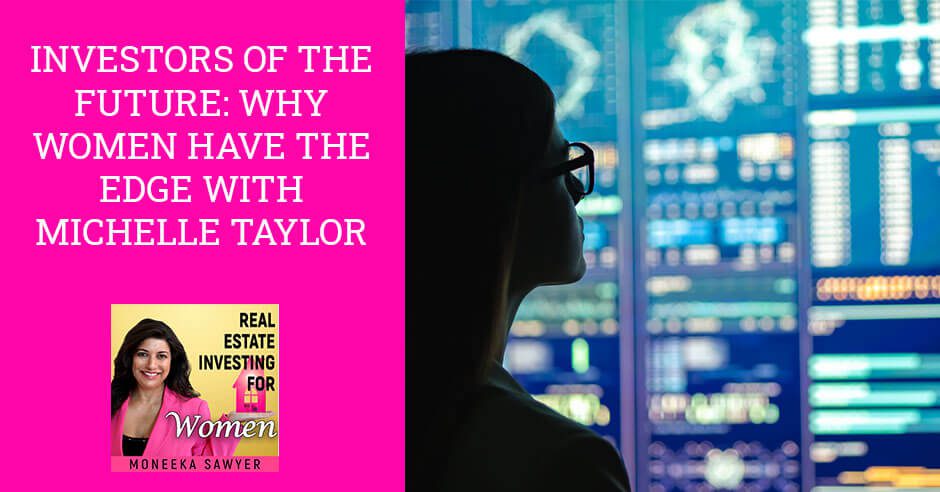
Women are the real estate investors of the future. Moneeka Sawyer welcomes Michelle Taylor, the City General Manager at Sundae. Women are the future because they bring a new aspect to the business. Whereas men tend to be rigid in following standards, we are more creative. When female investors see a property, they can consider three different options to add value. We also tend to play the longer real estate game by passing on the legacy. Teaching others how we succeeded means more to us than quick selling. If you want to know more about a woman’s edge in the real estate business, tune in!
—
Watch the episode here
Listen to the podcast here
Investors Of The Future: Why Women Have The Edge With Michelle Taylor
It is so interesting that March 8th is Woman’s Day because it is also the birthday of the most powerful woman that I know, which is my mom. I feel like it is not ironic. It is not a mistake that my mom happened to be born on that day. It is such a special day for me on so many levels and all of you ladies because it is Woman’s Day. It is a day where we celebrate the power of the woman, and that is you. Sometimes, we do not feel very powerful. We feel like the world is so male-dominated, especially in this industry. We do not feel as powerful as we are.
This episode is a special honor to you ladies. I am talking to a company focused on helping women be successful in the real estate market and investing. One of the things I hear a lot from you, ladies, is, “How do I find my first deal? How do I get started? How do I know if I know enough? How do I get money? How do I get my first deal?”
We have covered the other topics quite a lot. The deal thing seems overwhelming, “Where can I get my deals? Where can I go to invest? How can we make this system a little bit simpler?” I got a phone call from a woman named Betty Sheu at a company called Sundae. She is like, “We would like to be on your show. We are doing a Woman’s Day campaign. This is what we do.”
What they do is they help to vet properties that are good for investors. I nearly jumped out of my chair. I was like, “This is what my ladies need. We have not had this on the show yet.” Here you go, a present. We are talking about how to get properties and make it simple. We are talking to a company called Sundae, but we are not talking to a company. We are talking to a person from Sundae. Her name is Michelle Taylor.
Let me introduce Michelle a little. This is what she says about herself. I love her little story. She says, “I grew up with parents owning rental property, and as they told me, it is how they paid for college tuition on their humble salaries. It is also one of the reasons I am passionate about exponential opportunities in real estate, particularly for women and people of color looking to bridge the economic gaps. Professionally speaking, I am a licensed agent and City General Manager at Sundae, where I get to marry my fascination with startups and my love for solving problems all while getting to do good work.”
The platform that we are talking about is called Sundae.com. Go check it out. “I am also a wife, mother of five, and budding buy and hold investor of a few short-term rentals in Sacramento.” This was so sweet. Michelle was like, “Welcome to Sacramento.” You ladies know I am moving. I am so excited to be making a connection up there so we can talk real estate.
—
Michelle, welcome to the show.
I am glad to be here. I am super excited about being one of the first people you might be meeting in Sacramento and around this topic. I feel very lucky. I have a lot of reasons to be excited about this episode, and this topic has me ecstatic.
You are a powerful woman, a mother of five, and a real estate investor. That is exactly the person that we want to be talking about or talking to on Woman’s Day. Michelle, why don’t you jump in and tell us about your story? The two-minute high-level version.
Women bring a new aspect to the business.
I did grow up with parents who own real estate. I did not quite understand why they wanted to own another house that we would not live in and how come we never lived in the house? I am about to go to college, and I remember thinking, “How are my parents going to pay for this?” My mom said, “You know that house over there that you always complain about when we have to go and clean up or do the things that require having a buy and hold?” She would say, “That is my workhorse. I am going to get some money out of that and I am going to pay for your college tuition so you are not worrying about those things as a student.” I know that my parents’ dream was to send their kids to school and they were able to do that through real estate.
How did you get started?
I worked in a lot of startups. I have a fascination with startups because you are always solving problems. I work for one of the budding major public companies now. When they were a startup, I was there, and I thought, “I am working with all these real estate agents. I understand what they are trying to solve. I want to get into real estate.” From there, I worked retail for a number of years. I realized that although there are plenty of shows on HGTV around that, there is so much more to the work and there are so many other layers of real estate.
There are even so many more opportunities than just living in the home that you are enjoying. I start to get exposed to more of that work as you start to meet clients, and they carry you along their journey, and then you want to take your own. That is how real estate got me between my parents and the creative problem-solving.
Were you an agent first and then you became an investor?
I had a chance to see other investors buy homes that I thought, “No one is going to want to take on this major project.” You realize there is this whole other sector of folks who can’t get enough of those properties because they see an opportunity to improve the home, bring more value to the neighborhood, and run their business from the work that they have done. It has been fun to watch. I finally took the leap myself and had a buy-and-hold property.
All of you agents out there, I know that you are reading this because you want to become investors. I love when I see another agent that has done that. You guys have access to properties in a way that the rest of us do not. Another point I wanted to make here quickly is that you do not need to be an agent or an investor.
I do not carry my license because I found that in California, it caused a lot of disclosure problems when I carried my license and wanted to invest, so I gave up my license. There are lots of different ways to do this. I know a lot of investors, and the very first thing they say is, “I am going to go get my license.” That is not necessary. Would you agree with me on that?
I would agree. The majority of investors that I work with have the same philosophy. It allows them to focus on their business and not have to worry about the licensing component of traditional real estate with the license.

Investors Of The Future: Startups are fascinating because they always solve problems.
It is because you have got to renew that license and hang that license somewhere. Usually, you have to pay that broker. There are other obligations around licensing. I did not want to deal with that either. Sundae is focusing now on getting women investors and you have got 9,000 investors. Is it subscribed to the platform?
It is not a subscription, but they are able to come to the platform and vet properties online. They are able to see properties and access home inspections, which saves them a lot of time. They are able to see reports so they can do virtual walkthroughs. Our value add is for them to be able to compete on a property because we know how hard it is to come by inventory these days.
You will see a lot of property without necessarily having to step foot in it, which will save you some time and also provide discovery documents so that you are able to see, “How did it inspect? What is the condition of the title? What are some things that we may have to navigate to be able to resell this property?” It is a great time saver and also the insight, lots of content for investors who consume on our website. They are able to also learn about the business as they are growing.
You have got 9,000 people that are on the platform as investors, but only 20% are women. Is that true?
That is correct. We want to see that number grow. I personally think that women are able to bring a new aspect to the business. We want to let all people know that we are out here, especially women who may feel like it is a challenging industry to step foot in. It is an avenue to help bridge some of those gaps. If you want to feel secure about the opportunity that you are going to consider to flip or hold, the more information you know and the quicker you can review that information, the better you are going to be able to compete and win one of your biddings and to also feel confident that you did not necessarily buy completely blind. If you can’t walk through a home, that can be daunting. At least if you have some materials to review, it can make you feel much better about your decision-making.
You bought a property in Sacramento off of the platform. Is that true?
I have not bought it through our platform as an employee. I purchased the home prior to working for Sundae. I have worked with investors who do. I have a female investor who buys lots of buys and holds. She does short-term Airbnbs around the Sacramento region. She has a very particular buy box that she is trying to find. She wants to be near hospitals or colleges.
She has the particular square footage and age that she is looking for. You will see her win bids quite frequently because she is very familiar with our platform. She is able to engage with our content, make a good decision quickly, and then bid aggressively where she feels like there is going to be lots of competition. She enjoys our platform and talks very highly about how much it saved her money and time over 2021.
I believe women have a huge advantage in real estate investing. There are disadvantages, too, but could you talk about your perspective? As female investors, what are the advantages and disadvantages that we bring to the table?
Women tend to be more willing to play the longer real estate game.
What I see among female investors is that they are very creative in their approach where they will see a property and might see three different options, “We could do an ADU or accessory dwelling in this space. We could update part of the kitchen and most of the bathroom or all of it.” They are very creative in adding extra space to get more value-add of the property.
Whereas sometimes our counterparts, when men are approaching a flip, it can be very standardized in their approach, “We are going to flip every component of it. We are going to stick exactly to the previous footprint.” These are some generalizations but I do find that women tend to be much more creative with the use and their approach when remarketing the property. Creativity is our advantage.
I am out in Sacramento every weekend because we are remodeling our new home and I am there with my business partner. We have started to look at other properties. He is a guy and I am a woman, so we balance each other beautifully in the business. It is funny because I drive him crazy with what you are calling creativity. We look at a piece of property, and he is like, “We could build four condos here. I do not know if it is going to pencil out. Lumber is expensive.” I am like, “What if we did this? We could have one facing that way.”
He is like, “We do not know if it is zoned for that.” I am like, “We can find out about that.” I am talking to my contractors about remodeling my house. I am like, “We could do this. What do you think? What is the best option?” He is like, “We normally do this.” I am like, “Yes, but we could.” It is interesting. I come into the conversation, and I drive these guys crazy.
Once they settle down, they are like, “That is a great idea. Yes, we can do this.” This is one of the things, ladies, and I do not know if you have found this too. You come into the conversation, and you have to give them a few minutes to reground and rethink because they do not move. We can move in so many different directions so fast, and the guys are like, “Slow down.” They need a day to digest.
I also think that women tend to be more willing to play the long game in real estate. More often, when you are talking to male investors, it is about, “How quickly can we sell this?” The profit margin for each one of those deals within the investment community is majority flips. Most of the women I work with all have a decent size of portfolio of buy and hold. In fact, they will say, “I am never selling these.” That is where they see themselves.
I see a lot more of that too. My business partner says it is more like a savings bond. It is for the future, pay for education or retirement, and we want to hold them to pay for those things. I wonder how much of that is because we do not want to have our hands in the mud on this. You do not want to be getting our hands dirty. We do not want to be doing all the flipping and that stuff because we have to hire contractors for the most part. That is not always true. Again, we are generalizing. Women are like, “I am happy to make this the long game because we do not want our fingers in the mud.” Would you say that that is true?
I would say that is also things I have observed in the businesses. It is also, “I want to hold on to this as long as I can. I am thinking more of the legacy or what to pass on to my other family.” Whereas I see men are, “Let’s take this down, demo this, and get this back on the market and move on to the next one.” It is a much more hands-on, hands-off approach.
If you could look back to where you started, what would you advise yourself based on what you know now?

Investors Of The Future: Female investors are more creative because they can consider three different options when they see a property.
I would have started sooner and where I could. In my mind, I had to have a certain amount of income in the bank already to do certain things, or I had to be a certain age. If I had started in real estate younger, that would be great, even if it would have been just a condo. Now that I look back and see that those prices have changed so much within a ten-year span, you think, “I could have bought twice as many units if I would have been willing to take the leap. I could have been less fearful and more creative in my approach.”
That is one of those things that I see with women all the time. We want to be ready. It is like having a baby. Maybe you wanted a baby your entire life, but you are never quite ready. There is never a good time. You know this better than anybody. When you want something, you got to do it. That is the same thing with real estate. We need to birth that business because if we don’t, it does not have an opportunity to grow as fast for us in our lives. I always want women to start sooner than they think they can.
It will teach you something. Sometimes, we imagine that maybe we will have a property for a long time. You realize, “It is time for me to let this one go because a better opportunity is coming.” I feel that real estate, like children, will teach you something about yourself, too, like, “Why am I so attached to this property? Why did I think that this was a great deal?” There are all sorts of things and you learn something both about the business and yourself with each property as well.
This is not real estate or any business. You do find out what you are made of when you are investing.
Even your threshold for pain.
As you learn those things, you are able to do the business better later. It improves your life too because you realize how powerful you are. You will find with that threshold for pain is it is significantly higher than you thought it was. I would say, “There are tears in real estate.” You find where those tears start and how much you can take. This is not supposed to be scary. You grow, and you realize your power and your capacity. The reality is almost anything that comes up is not going to take you down. You take it down.
There are tears of joy, for sure. It does something to you when you are able to visualize getting a property for particular use in terms of an investment and then manifesting that where it is like, “This is an Airbnb and rental property. This did sell.” I thought it, I imagined it, and I executed it. I can do it again. When you get good, you can teach other people how to do it too. That is a powerful thing anytime you can pass it off on.
We do have an EXTRA coming. We are going to be talking about what the biggest red flags are that Michelle looks for when considering a deal. She is going to talk about not just what she looks for but what she is seeing a lot of her ladies on the platform and what they are looking for. She is going to be showing that with us in EXTRA.
Also, as our free gift to you, Michelle and I are going to be holding a webinar. She is bringing in someone else. Her name is Jennifer Welborn. We three ladies are going to come together for a Woman’s Day Special to talk about overcoming roadblocks as women property investors. We are going to be doing a webinar on Thursday, March 17, 2022, from 1:00 PM to 2:30 PM Pacific Time. Go to BlissfulInvestor.com/WomansDay. Did you want to talk about what you guys are going to be covering in that webinar?
Starting in real estate when you’re younger would be great.
We are interviewing you and finding out more about what it is that women should be looking out for in a real estate deal.
This is going to be a different webinar. That is why Michelle is like, “I don’t know.”
I know that we have a lot that we are covering. When you are speaking for your company, sometimes those things are also developing.
What we have set up is we wanted to have three powerful women that are in real estate. Two of them are coming from Sundae. We are going to talk about what the roadblocks are that we have experienced, what we are seeing other women investors experience, and how we can overcome those things. It is going to be an open conversation. I am going to be interviewing them and they want to interview me. It is going to be a fun open conversation. The lovely thing about it being a webinar is it is live.
Those of you ladies, you can ask questions because you have experienced roadblocks. You are going to have three powerful women that you can personally ask questions of. It is going to be a fun open discussion. It focuses on the power of us, women as investors, and how to amplify that powerfulness rather than getting stuck in this isn’t working or the things that make us feel we can’t do it. Does that sound right?
Absolutely. The roadblocks that we all have to encounter and then either have solutions for or decide that we have to go in a different route.
Go check out Sundae at Sundae.com. Are you ready for our three rapid-fire questions?
Yes.
Tell us one super tip on getting started investing in real estate.
Get a mentor, learn from someone who you like, their work, they are able to prove success, and you can learn from them if they are willing to share their experiences.

Investors Of The Future: When you get good, teach other people how to do the same.
What is one strategy for being successful as a real estate investor?
Consistency. Looking at your market at all times of the year because there is some seasonality to it and consistently taking a look at deals, not always looking to purchase, but to know your market. The only way to know your market is to consistently review the deals that are successful.
One of the things that I appreciate about that is that even if you are not looking to purchase if you are looking around, you get to know areas, zoning, and parameters so that when you find something that you want to make an offer on, you are ready to go. You have got all of this wealth of information on that market. You can confidently make offers. Nobody has said it that way. Thank you for that, Michelle. I love that. What would you say is one daily practice that contributes to your personal success?
I get up pretty early every morning and I make at least an hour of that morning to be about centering myself, usually through some form of fitness. We spend a lot of time in different mental buckets of thought. As an investor, you have to jump through. Sometimes, you are thinking financially, marketing, and also the economics of what is the next year going to look like.
You are able to do that fluidly. You also have to be physically disciplined so that you can do the work when it is not always your wheelhouse, but it is part of the business. You can flow freely in the areas that are your passionate parts of it and tap into your creativity. Having that morning hour helps those days be a little more inflow than out of flow.
I also believe that exercise gets my mind more stabilized. It gets me more into my body, so I am able to utilize all my resources. I do feel like exercising makes me significantly more creative.
That is exactly why I do it because there are some mornings where I am like, “I am so tired. I can’t believe that I chose to get on this treadmill.” As soon as it is over, I am like, “That is why.” I feel like my mind is snapping into clarity.
Michelle, thank you so much for all you have offered on this portion of the show. This has been super fun.
I wish everyone reading this and considering going into investing to come and check out properties first on Sundae. There is a great place to get started. From there, you would be able to have some documents to feel much more confident about the deals you would be stepping into.
The only way to know your market is to review the successful deals.
Remember, we do have a webinar. You are going to get more of Michelle and more on this topic about how to overcome roadblocks and become a successful investor. It is an open panel. We will be chatting with each other. We will love your questions. Remember to join us on Thursday, March 17th, 2022, from 1:00 PM – 2:30 Pacific Time. Go to BlissfulInvestor.com/WomansDay. I hope to see you there.
Ladies, stay tuned for EXTRA. We are going to be talking about what are the biggest red flags Michelle and her clients look for when considering a deal. If you are subscribed to EXTRA, please stay tuned. If you are not but would like to be, go to real RealEstateInvestingForWomenEXTRA.com and you can sign up for free for the first seven days.
After that, it is a subscription, but it is a very low cost. It is a huge value for what you pay. For those of you that are leaving Michelle and I now, thank you so much for joining us. Be the most amazing, beautiful, wonderful self that you are. I am so delighted to have you on this journey with me. I do look forward to seeing you next time. Remember, goals without action are just dreams. Get out there, take action and create the life your heart deeply desires.
Important Links
About Michelle Taylor

Real estate is artistic capital. I help people enjoy it.
______________________________________To listen to the EXTRA portion of this show go to RealEstateInvestingForWomenExtra.com
To see this program in video:
Search on Roku for Real Estate Investing 4 Women or go to this link: https://blissfulinvestor.com/biroku
On YouTube go to Real Estate Investing for Women
Moneeka Sawyer is often described as one of the most blissful people you will ever meet. She has been investing in Real Estate for over 20 years, so has been through all the different cycles of the market. Still, she has turned $10,000 into over $5,000,000, working only 5-10 hours per MONTH with very little stress.
While building her multi-million dollar business, she has traveled to over 55 countries, dances every single day, supports causes that are important to her, and spends lots of time with her husband of over 20 years.
She is the international best-selling author of the multiple award-winning books “Choose Bliss: The Power and Practice of Joy and Contentment” and “Real Estate Investing for Women: Expert Conversations to Increase Wealth and Happiness the Blissful Way.”
Moneeka has been featured on stages including Carnegie Hall and Nasdaq, radio, podcasts such as Achieve Your Goals with Hal Elrod, and TV stations including ABC, CBS, FOX, and the CW, impacting over 150 million people.
Tax Strategy: Igniting Your Unique Wealth Formula With Lorraine And Jim Conaway
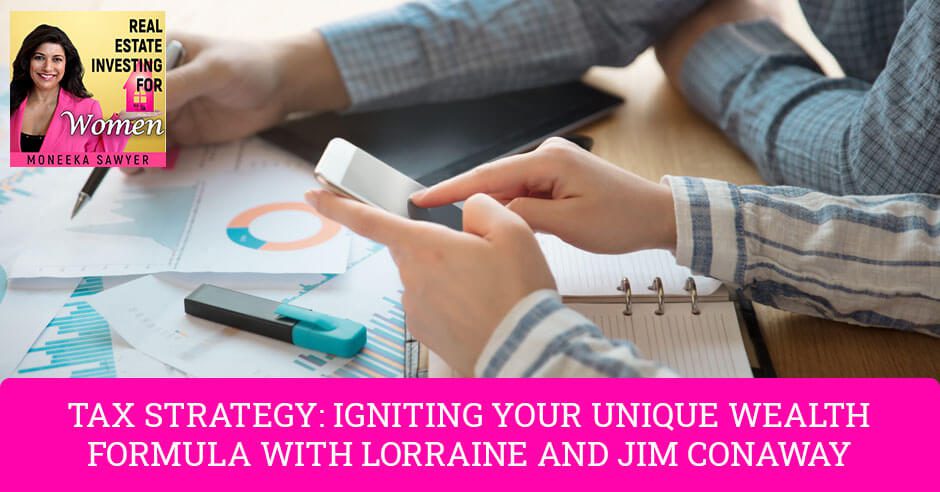
Your CPAs are your defense players; they’re defending the goal. Your tax strategists are the ones putting the points on the board. They make sure that you’re using the right and most efficient strategies. Join Moneeka Sawyer as she talks to Lorraine and Jim Conaway about tax strategies. They believe that success is truly about education, support, and the art of supercharging your unique style of wealth accumulation. Find out the difference between a CPA and a tax strategist. Discover the process and learn how they evaluate your taxes today!
—
Watch the episode here
Listen to the podcast here
Tax Strategy: Igniting Your Unique Wealth Formula With Lorraine And Jim Conaway
Real Estate Investing For Women
Using their extensive experience, knowledge and success in the world of tax strategies, real estate investing and other wealth vehicles, Jim and Lorraine used their straightforward, big-hearted style to guide thousands to ignite their unique wealth formula. With decades of success, designing and implementing customized wealth solutions, they appreciate that success is truly about education, support and the art of supercharging your unique style of wealth accumulation.
—
Jim and Lorraine, welcome to the show. It’s nice to see you.
It’s great to be here. Thank you.
We’re excited.
Lorraine has been on this show before. I’ve met Jim several times. We’re all in a mastermind together. I was so excited to share the two of them. Lorraine is so brilliant and shared such good stuff about the CARES Act. They’re such an incredible power couple. The 1 plus 1 does not equal 2 and equals 11. That is true. I’m so happy to have both of you with us. Let’s start with a little bit about the story of how you put this company together. You cover a lot of good stuff like all sorts of strategies around real estate. I remember when I first talked to Lorraine, my first thought was, “Where have you been all my life?” You talk about all these different strategies. The one that I am engaging you for is taxes. Let’s talk about how that piece started for you.
You would think that being a tax expert, a CPA, would make you a tax strategist. That is not the case.
It organically came together. We met in the business.
My first thought was, “Where has she been all my life?”
In the business, years ago, we were working at an insurance company. We started our company in 1996. We worked for ten years side by side with the CPA. Along the way, we started investing in real estate. My father is a contractor. He always had real estate. We had the real estate going on the side. We had our business working. We’re learning about taxes and finding that there was an enormous amount of money in the tax return. I was frustrated like, “Why are people talking about this?” Even in our situation, when we got our taxes done, our CPA said, “You could have saved $18,000 if you had this type of structure.” We’re like, “You tell me after the fact.”

Tax Strategy: Think of your CPA as your defense player; they’re preventing points by defending the goal. They’re not putting points on the board. The tax strategists are.
We have to spread the word, educate people and let them know that there are better ways of doing things. That you could keep much more money in your pocket and then get the education on real estate, not just investing but understanding how to maximize your real estate portfolio feeding in the tax strategy with the real estate and business. We’re business owners and entrepreneurs. Over the last few decades, it all came together like a recipe going, “This tastes good.”
You look at taxes differently. You are business owners. You two are not CPAs. You have a CPA team. You marry the business mind with the CPA mind, which I love. Talk to us a little bit more about what makes you or your team different from other accountants.
I’m going to jump in here and dovetail into something that Lorraine talked about. That was how we came to be about how we are. We learned by working side by side with CPA and learned an enormous amount working with that man and his practice. What we found was that by doing the tax strategy, we were having a greater impact than we were working with people’s assets. We learned to turn our world upside down and work from the tax down. What makes us different? Is there isn’t a class out there? There’s not a designation out there that says, “You’re a tax strategist.” This is where people disconnect. You would think that being a tax expert, a CPA would make them naturally a tax strategist. That is decidedly not the case.
My analogy is a sports analogy. Think of your CPA as your defense player. They’re preventing points by defending the goal. If you think about their language, that’s how they operate. “Can I defend this with the IRS? Does that make sense? Can we justify it?” Those are the words that you hear from them. They’re defense players. They’re not putting points on the board though. That’s our job. If you’re using the soccer analogy, think of your CPA as the goalie. Think of us as the kicker, the point, the guy that gets the ball and puts it into the other net to score points.
We came about how we are by organic growth, most of it from our painful experience. When you’re trying new recipes in the kitchen, that’s always a mess in the kitchen. What our clients get to enjoy is the fact that the recipes are all nicely laminated in cards. We’ve gone through. We know how long to leave things in the oven. The biggest difference is we are the people that are putting the strategies in place before the taxes.
Other people have brought it to our attention that said to us, “Do you know why you’re unique and why you’re different and why you have success?” I’m like, “Tell me why.” They say, “It’s because we focus on the implementation.” When you meet with somebody and they said, “You could get an entity, maybe do a cost sag on your real estate, deduct a certain way or your accounting, £6,000 on a vehicle and all of these things.” What happens is there’s a lot of information out there like on the internet. It’s like, “Who do I trust? Where do I go? What is the right fee?”
It’s like, “I get an entity. What’s the state that I live in? If I get an LLC, is it a partnership? Is it a disqualified partnership? Do I file as a SEVIS or C corp?” There are all these other questions that people are left with going, “I got information but who has time to sit with me, hold my hand and say, ‘This is too complicated. It’s too much. My CPA tells me to get an escort but my attorney tells me to get an LLC. Which one is right?’” What we like to do is get both parties on a joint call together and discuss it. Let’s get all on the same page. We’re advocates about teams, getting the right team on your side, working together collaboratively and not having to redo your strategy and focus on implementation. Almost all of our time is focused on implementing the strategies.
What I love is that if you’re working with a tax strategist, you have all of the team members available to you. They all understand similar strategies and are having conversations. I’m not talking to my lawyer bringing information to my CPA. I’m not playing the middleman. With me not knowing what I’m talking about in the first place, which is why I need them. We’ve got a middleman that’s educated, doing it themselves and understands the process.
Don’t treat people based on their checking accounts. Treat people based on who they are and provide as much value as possible.
In the past years, I’ve been using a tax attorney. This speaks to what Jim was talking about. The reason I used a tax attorney is that he’s on my side, not on the IRS’ side. He’s not playing defense. He’s playing business coordinator for me. In part of what he does for me if I were to ever get audited, as he represents me in court and that thing, they handled that whole picture. Jim, what you were saying about how we’re not playing defense rationally doing an implementation. You’re making the goals. How does that work? You are a CPA firm. Their responsibility is to the IRS. Could you speak to that a little bit more?
In my next appointment, I’m going to be sitting down with a CPA who only has several years of experience in advanced planning. I’m going to be sitting with him to review a tax strategy for a client. What I do is cook up all the good ideas that would apply to this client. We sit with our CPAs and edit them. “This would work but less of it. This would work, let’s do more of it. This won’t work at all. This works brilliantly.” We go through and do the checklist. When we do that, we have a tested strategy. We also put it in writing. The client has something to hold on to. I want to do 1, 2, 3, 4, 5, 6, 7, 8 different strategies.
I’ve got the rules and description. I understand it. If I want to read the document, most of our clients browse it. They don’t read it. They have a deliverable that they understand what the tax team is supposed to do. Here’s a critical element. The tax team also gets a copy of it so they understand what the taxpayer needs. If you were our client and we’re looking forward to working with you, you would get a deliverable that tells you all the strategies.
The tax team gets the same deliverable so that when they’re looking over the tax organizers, there are 50 pages of questions that nobody knows how to answer. You do your best and send it down. Our tax people look at this stuff. They see the strategy and don’t see the information they need. They know there’s a disconnect. Reach out to the client and ask them for the information. “How big is your house?” “It’s this big.” “How big is your studio with the lovely rice paper screen in the background?”

Tax Strategy: Tax strategists got the rules and descriptions. Their clients have a deliverable, so they understand what the tax team is supposed to do.
That all goes in there. You can see immediately that there’s an enormous amount of connection. Imagine for a minute that we’re sitting with you as our fresh client and we suggest, “Your tax strategy calls for a C corporation. Do we have a network partner that knows how to set up C corporations and that’s their focus and they’re good at it?” They’re already exercised and working with us as part of the team. That’s the thing that helps with the implementation. Everyone in the network that’s already been through the process knows. You don’t have to explain it. It’s one and done. Once you go, “I approve of this strategy,” then it’s off to the races. Everybody knows how to do what they got to do.
In the case of an audit, do you support your clients? How does that look?
What it looks like is we take a 40-year CPA and put that 40-year CPA between us and the bad guys. That 40-year CPA will handle most audit questions. Remember, every strategy is A) Legal, B) Approved, C) All the documentation is in the strategy. It’s like, “Here’s the homework. Where’s the mileage log? Where’s this log? Where’s that log?” We collect the data and put it together. We go and handle the audit. You should also know, this is one of my favorite questions is it a red flag?
I hear this all the time. When you get, “That’s a red flag,” don’t do and write that off. That makes your return auditable. Many right eyes I haven’t taken because of that.
Not true. It’s a myth. The thing that is more likely to cause an audit than anything else is the size of the numbers on your tax return. The larger the numbers, the more likely you’re going to be audited. Think about it. Logic. If you are a tax auditor-manager person, would you audit somebody who has had a $50,000 tax return? Would you audit the guy with a $500,000 tax return? It’s $500,000 all the time. What this tells us is that we have, roughly speaking, a 3% chance of an audit. If you went Vegas and you knew you could pull that handle on the one-armed bandit and you had a 97% chance of winning, how often would you be pulling that enamel?” We don’t want to push the IRS but we want to do everything that we’re legally entitled to. That’s what the strategy is all about.
It’s about following the rules. Another thing that I see is that when there are errors like we had somebody who doubled expense something or there’s not a matching item when it’s not matching, the IRS is going, “Why is this not matching? You got 1099 for X amount of dollars but you reported a different number.” Those types of things are errors. One thing I would say though, from my experience is that people who have very clean accounting and books either have a bookkeeper or they’re doing it themselves but they’re using like a QuickBooks process.
You get clean PNLs, no commingling of money in your corporate checking or your real estate, keeping the real estate separate from your checking account, you pay your groceries and your bills. You got to keep your real estate separate. When you have clean accounting then it’s so much easier process than going through an audit. When it’s commingled and muddy like that, it’s a nightmare.
Do you help people to understand what all of those things are? What is it exactly that we need to avoid this idea of commingling and stuff like that? It’s bigger than the account that you pay for your groceries and business account. I’ve got five different businesses. There are intricacies to that too. Do you help guide people on how to make that last money?
Typically, we’ll ask people, “Do you have a bookkeeper? Do you have a separate checking account?” Starting with the basics of having a separate checking account. When people ask us about those questions, we will go through them and go deep. When they don’t ask us, it’s because we’re covering so much material and education. Everybody’s so different. Some people have different specific needs and goals that they want to know answers to. They might be selling a property and are like, “I don’t want to do 1031,” or whatever it is. It’s all over the map.
We will help the people as much as we’re able to help the people. What we would do normally with bookkeeping is we’ll bring in somebody who is a CFO-level bookkeeper, have them audit the books and let us know exactly what they see. I spoke with a client. In 2021, we brought in our bookkeeper who was trying to be nice to the client, politely pointed out that there were some small changes that they needed to make in their bookkeeping. It turned out that was $540,000 worth of loss carryforwards that they had never reported. The bookkeeper found this error. They save taxes on over $500,000. It can be very valuable to have somebody go through and make sure the books are nice and neat, somebody with an accounting background, not just a bookkeeper.
Tell us what kind of person should engage you. Does it matter where a person lives?
It doesn’t matter where a person lives. They can live in any of the 50 states. We’re nationwide.
People who are alive. That’s the first criteria.
Typically, the people who have more complex and multiple returns have greater value. The more opportunity on saving taxes is the greater value. If you could save $500,000 in taxes, that’s great but there’s no minimum. We work with everybody.
Lorraine and I went through a season where we weren’t financially successful. This is way back when we were quite young. We remember what it was like and how it was when we got treated well and we didn’t get treated well. We committed that we weren’t going to treat people based on their checking accounts. We were going to treat people based on who they were and provide as much value as possible.
Let’s talk about costs. What is this going to cost? Are you going to give blissful investors a special deal?
To do an evaluation takes us quite a bit of work. The process is we reach out and we’re going to have the link. You go to the link. It’ll be a pink link.
They made a landing page especially for my community. As we were talking about it in the green room, I was like, “It has to be pink.” That’s what that reference is.
They will have the opportunity to raise their hand and say, “I would like to have my taxes evaluated to see if there’s any money to be saved.” The evaluation does take time and effort. It’s normally $497. How much are we charging the blissful investors?
We’ve discounted it to $97.
Save taxes so you can turn around and invest that money.
That’s the deal you ladies are getting. When you go to the website, which is BlissfulInvestor.com/taxstrategy, that’s where you would get the Last-Minute Tax Deductions, which is the free report.
It’s 2021 and they will be useful for 2022.
You also get the added benefit of 80% off of an actual consultation with them. Is there anything else you wanted to add before we go into the three rapid-fire questions?
I’m looking forward to people saving taxes so they can turn around and invest the money.
Find more real estate.
That’s the big thing. That money is saved for our businesses. Grow your real estate fempire. That’s what I’m calling it. Become a real estate mogul. It’s good to understand that this is a business strategy. Thank you for mentioning that. Here are our three rapid-fire questions. What’s a super tip on getting started in real estate investing?
The first thing is you have to understand that getting started in real estate means moving. I don’t care what you do. There’s no shortcut. It’s getting moving. If you’re in action, you can do something like wholesaling or sandwich places. You can save money and buy income properties. You can use your tax savings to help you save for your real estate. Get in motion. That’s the bottom line.
What is one strategy for being successful in real estate investing?
Saying yes to your wife.
That’s good advice. We need the guys to read this.
It’s managing the manager. Before you manage the manager, do some serious due diligence and find the right manager because you can have the most amazing property in the great area and grants and have terrible management. If the management is not responsive to the tenant, the tenant is going to move out. You’re going to have a vacancy and then the property is going to go downhill. Management is crucial and critical. Managing the manager is important and making sure you have the right manager.
Make sure that they’re going to be responsive to you, the investor.
You guys don’t do turnkey properties but you help people to find them to be working with teams that find you properties that have leverage. In real estate, we love to talk about leverage. Part of that leverage is our relationships. If you’re going with a turnkey operator or something like that, they have many properties so they can put pressure on the managers if things start to go sideways.
We do have vendors with properties with turnkey. We have already done the due diligence and have our properties with these vendors.

Tax Strategy: The thing that is more likely to cause an audit than anything else is the size of the numbers on your tax return. The larger the numbers, the more likely you’re going to be audited.
What was the cash-on-cash return for that one investor?
It was about a 20% cash-on-cash return. We also have amazing non-recourse lenders, which we can explain at another time.
We have to talk much more. We’ve got lending, turnkey, notes, self-directed IRAs and so many amazing things. This is why I was like, “Lorraine, where have you been all my life?” They’ve got all the different pieces and you’ve got access to them in one place.
The network has developed over the decades. Somebody said to me, “Do you know how valuable your address book is?” We don’t have address books but what I’m talking about is your network, your Rolodex. I was like, “I didn’t pay attention because I’ve been doing my job and working in expanding and getting all the pieces and all the people to bring it all together to create great success.”
I like both of you to answer this. What is one practice that you do daily that contributes to your success?
For me, it’s saying, “Yes, dear,” multiple times a day and staying very close to our real estate vendors and various network partners.
We don’t want to butt heads. Although we both meet with people, we have different roles in our business and working together. One thing for me is I focus on the critical things that I have to get done for the day before I even open an email. I have to get control of each day. Stay focused and accomplish what I said I was going to accomplish.
Thank you for that. We do have EXTRA. We’re going to be talking about the Augusta rule, which is a tax write-off that nobody seems to know about. It’s so interesting because when I did my tax evaluation, Lorraine was like, “You’ve heard about the Augusta rule. Why are you not using it?” I was like, “Can I use it? I’m just a little guy. What is this?” It could have saved me $20,000 in taxes. We ran the numbers. I’m super excited about it. It’s simple and available to many different people that wouldn’t expect it. That’s one of those little strategies that is often missed. It shouldn’t be. We’re going to talk in detail about that in EXTRA. Did you want to add anything to that?
No. I’m looking forward to speaking about that in your EXTRA.
Ladies, if you are subscribed to EXTRA, stay tuned. You’ll get to know about the Augusta rule. If you would like to subscribe to EXTRA but you have not yet, go to RealEstateInvestingForWomenEXTRA.com. The first seven days are free. Get in there. Seriously, this is the time to do it. If you don’t love it after seven days and you’ve gone through the content, you get to make that choice. For those of you that are leaving Jim, Lorraine and me, thank you so much for joining us for this portion of the show. I hope you enjoyed it and got great value. I look forward to seeing you next time. Until then. Remember, goals without action are just dreams. Get out there, take action and create the life your heart deeply desires. I’ll see you soon. Bye.
Important Links
- Jim Conaway and Lorraine Conaway
- Lorraine Conaway – Previous Episode
- BlissfulInvestor.com/taxstrategy
- RealEstateInvestingForWomenEXTRA.com
______________________________________
To listen to the EXTRA portion of this show go to RealEstateInvestingForWomenExtra.com
To see this program in video:
Search on Roku for Real Estate Investing 4 Women or go to this link: https://blissfulinvestor.com/biroku
On YouTube go to Real Estate Investing for Women
Moneeka Sawyer is often described as one of the most blissful people you will ever meet. She has been investing in Real Estate for over 20 years, so has been through all the different cycles of the market. Still, she has turned $10,000 into over $5,000,000, working only 5-10 hours per MONTH with very little stress.
While building her multi-million dollar business, she has traveled to over 55 countries, dances every single day, supports causes that are important to her, and spends lots of time with her husband of over 20 years.
She is the international best-selling author of the multiple award-winning books “Choose Bliss: The Power and Practice of Joy and Contentment” and “Real Estate Investing for Women: Expert Conversations to Increase Wealth and Happiness the Blissful Way.”
Moneeka has been featured on stages including Carnegie Hall and Nasdaq, radio, podcasts such as Achieve Your Goals with Hal Elrod, and TV stations including ABC, CBS, FOX, and the CW, impacting over 150 million people.
Real Estate Predictions For 2022 With Kathy Fettke – Real Estate Women
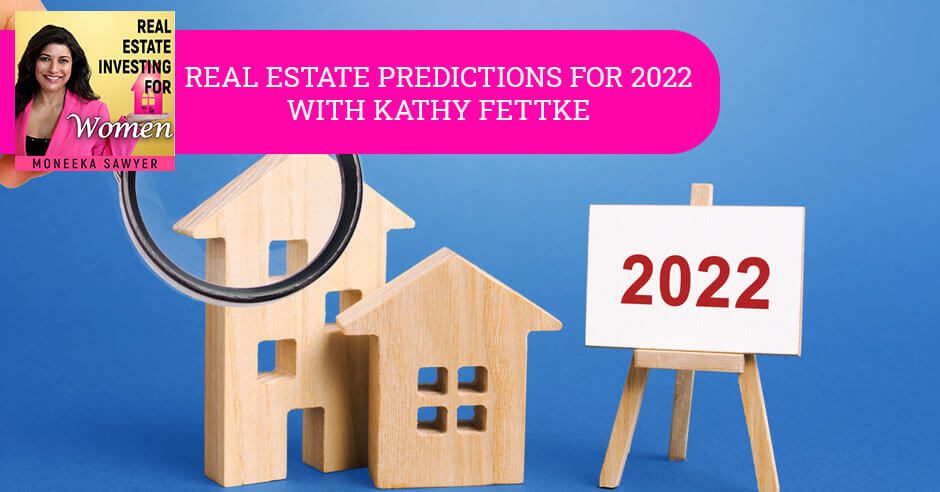
With the pandemic affecting everyone around the world for the past few years, it also impacted the economy. A lot of people are struggling to get by every day. Kathy Fettke believes that 2022 will be different due to inflation. With a passion for researching and sharing the most important real estate and economics facts, Kathy is a frequent guest expert on such media as CNN, CNBC, and Fox News. In this episode, she emphasizes that people need to be cautious in buying and selling homes. The demand for houses is rapidly increasing, so the supply is insufficient, allowing opportunities to house rents.
—
Watch the episode here
Listen to the podcast here
Real Estate Predictions For 2022 With Kathy Fettke – Real Estate Women
Real Estate Investing For Women
Kathy, welcome back to the show. It’s nice to see you.
Thank you. It’s so nice to be back.
Thank you so much for having me on your show.
I learned so much about you that I did not know.
When you hang out with people and you get to know them, you respect them, but you don’t talk necessarily. We don’t talk about ourselves naturally. That was lovely, but thank you. What I wanted to share with my audience is what your perspective is on what to expect in 2022. Does that sound like a fun topic?
Let’s do that. It’s on everybody’s mind.
What are you expecting?
In 2020, I said I was expecting a Black Swan Event. Can you believe that? I did not know exactly what I was predicting there. 2022, we have a few factors in place that people need to be aware of. One is that we have inflation. We are seeing lots of inflation. For investors, the people who own real estate, that can be a pretty big deal. You can build some wealth. It’s not necessarily wealth because it’s inflation, but at least you own assets that are inflating. If you don’t have assets, then what you have is the higher prices. People who own assets in inflation are going to increase your net worth, and those who don’t are going to have to figure out how to get in the game.
A coin with two sides. We got to look at all the sides. What happens in an inflationary environment is the Federal Reserve will then want to slow that down. The Federal Reserve is a central bank. It’s their job to curb inflation. That’s one of the key metrics that they look at. For a long time, the Federal Reserve was saying, “This inflation was transitory.”
Many of us were saying, “We will be checking in with that. It does not look like it’s going to be transitory when you printed so much money. That’s a whole lot of money circulating. That is going to create inflation.” A lot of us were questioning that, but here we are and the Fed is now saying, “It’s probably here for a bit longer,” which means they are going to raise rates to try to slow down the economy to try to curb inflation.
This is a big mouthful. It’s a lot that I’m saying, but bottom line, when the economy is chugging along and it’s going strong, that means people are getting hired and there are jobs, there’s a strong stock market, real estate prices are going up, and people are making money. They are spending money and all that is circulating, and the velocity of money is driving prices up. When you add to it, the fact that we have so many job openings, and that’s usually common in a robust economy, lots of job openings, which means that employers have to pay more to attract good labor, and there does not seem to be the labor out there, that causes inflation.
You add all the money supply that’s out there and this issue with materials and all these issues that we are having, trying to get the materials that we need, and because we can’t get them, the costs are going up. There are so many factors that are driving inflation that it’s forcing the Federal Reserve to raise rates, which historically has slowed things down in the past.
31 is the typical home-buying age. It’s a massive, massive amount of people over the next two, three years that are just coming into home-buying age.
Unfortunately, in the past, it slowed things down to a screeching halt many times. Often, in an environment like this, it would cause a recession. What we are paying attention to is will the Fed get it right? Will they do it nice and slow that the economy can adjust to it, or will it take the air out of that balloon? Moving forward, we need to be careful and cautious in 2022, about what we own, what we buy and what we sell.
It’s not going to be 2021, 2020 or 2019. It’s going to be more like 2018, where interest rates were going up. It was back in 2018 that the Fed did start tightening and started to slow down the economy a little bit. It was chugging along pretty good back then, too. That affected new home builders. They saw a slowdown, but the real estate market, in general, did not slow down, but new homes were having a bit of a more difficult time until 2019, when that reversed.
I don’t know if you remember, President Trump had a big fight with the Federal Reserve and they said, “You better stop raising rates. Stop it. Not on my watch. You are not going to have a recession while I’m president.” It’s basically what he’s saying. The Fed listened and turned it around. I’m not sure how that all happened, but it happened.
COVID came along and then the Federal Reserve did what’s called commodating, which is lowering interest rates and flooding the economy with capital. That worked and it got things going again, and now they got to put the brakes on. The bottom line is things could slow down a little bit, which is a good thing. It’s prices can’t go up at these double-digit rates forever. We do need to pay attention to the Fed and what the Fed does.
With that said, we still have some serious fundamentals in place, which is so many young people, these Millennials, who are reaching home-buying age, and there’s not enough supply for them, many of these young people who are forming families and want to have that backyard and never want to be stuck in an apartment again. In case, there is another COVID situation where you are stuck in your apartment and can’t use the pool or the facilities. People are like, “I want my own yard,” especially when they have got young kids and they are having kids. They are the largest cohort of Millennials is 29 years old.
Thirty-one is the typical home-buying age. It’s a massive amount of people over the next several years that are coming into the home-buying age. The product is not there for them. You are going to have a tightening and a raising of interest rates while there the demand is still there. I don’t see any housing crash, but the intent is to slow down the dramatic increase of prices, which may or may not work because the demand is still there.
We have all these studies. Historically, we know what the markets do. We know how to affect and change the markets. There are specific tools that the government has used for a long time with some success or not, but it’s an unprecedented situation this time. First of all, we had COVID so we had all this money that flooded the market, but also our expectations. Up until COVID, everybody was moving more into the cities, people wanted to be closer together and condos apartments, and then COVID, now people are going back out into the country, not the country, but you know what I mean.
All over. They are going to cities, too. There’s a massive household formation.
It’s because people are getting to choose. I don’t know if this is true all over the country, Kathy, help me to understand, but in the Silicon Valley where I am, we can now work anywhere. You can move to where you can get a larger house. Even if you are paying the same amount, you are getting a larger house that might be in a different city. Are you seeing that people have so much more mobility so they can make choices that are better for them and their families?
We are seeing that, but we are also seeing a massive demand for homes in Silicon Valley. I read an article about the mass exodus out of California. I know real estate agents in the San Francisco Bay Area who cannot keep up with demand, still have multiple offer situations. None of it makes sense. I would say that there are people who are making life decisions that they maybe could not before. That life decision might be, “I might sell this house while I can get multiple offers and go live in Arizona or Boise, Idaho, Texas,” or wherever they are going, and live a very different lifestyle.
You could sell your house in the San Francisco Bay Area and have the mortgage-free if you wanted to, or have a much bigger house for a much lower payment or have maybe better schools. A lot of people are making life choices that they maybe could not make before, but what that does is open up a property for someone who now gets to buy it, even though it seems so much more expensive than it was a few years ago, but maybe not with the interest rates.
My daughter bought a house that was probably $750,000. She paid $1,100,000. That payment is the same as rent in Southern California. She’s outside of LA and half an hour from me. She was able to take on such a huge purchase because the payment is not different than the rent. What was offered out there was hideous.
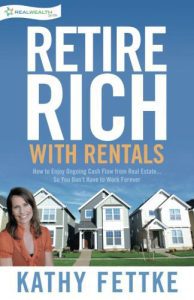
Retire Rich with Rentals: How to Enjoy Ongoing Cash Flow From Real Estate…So You Don’t Have to Work Forever
She could not find anything she wanted to rent, so she bought it. I’m so proud of her. She had listened when she graduated from college and got a job in Chico. I knew that the home prices were still in the $250,000 to $300,000 range. I was like, “Please, listen to your mama. Don’t buy a car and please go buy a house.” She’s like, “Mom, I’m 24. I’m not buying a house.” I said, “Please talk to a mortgage broker.”
She did. She found out she could own a house in Chico for the same price as renting, again, amazing in California. She did it. Three percent down. She had to put $11,000 down. She had it, she had saved it. She made $100,000 on that. When she sold that house, she was able to buy this $1 million house. It’s amazing to me that it’s the same as rent. All in, she’s at $5,500 a month, and that’s sadly what the rent is, but that’s how it is in the Bay Area too.
I had the weirdest situation. We had a bidding war for a rental that I was renting out where I listed it a little bit low, which is what I always do. I like to be in the middle of the market, not the high range, and provide a good product for a little less. It was the people motivated to stay. We had a bidding war that went over market. It did not go over market. It went right about the market.
Things are crazy to even as a landlord. You are right. There are all sorts of interesting things going on. I feel like it’s hard to understand and predict. That’s causing an awful lot of uncertainty with investors. There is this the right time to do it. What would you say to an investor around us? You told your daughter to buy, so that speaks very highly about getting to the real estate market.
I was worried for her, not that she was paying $1 million for a house that was $750,000. I was worried she was not going to find a place to live, and they have a big dog that’s part pit bull. He acts like he’s a poodle. He’s the sweetest little guy. It’s hard but no one’s going to rent to someone who has a big dog, a little dog, a baby, and another baby soon. The fact of the matter is, I look at my daughter, who’s 29 and she represents what’s happening. It’s anecdotal, I often look at her and she’s always shown me what’s going on when she was trying to get into a soccer team when it was very difficult because she’s the largest group of Millennials, the 29-year-olds, most competition.
She had a hard time getting into college. She did get into college, but she was competing against brilliance everywhere, that largest group of educated people competing for houses. Watch the 29-year-olds because they are facing what we faced or I faced as a Baby Boomer, competition. It’s a massive group of people who are the most educated ever of any group ever. They have more education at their fingertips, more access to information and data. They have the highest college degree rate. Our generation did, but they have more information than our government had when we were young. It’s incredible.
I look at her and honestly, my 29-year-old has no problem paying $5,000 a month for rent. Not even a problem at all. These are dual-income families. She works at home. She’s got a tech job. She’s focused on email marketing. It’s nothing that unique but it’s needed. As more businesses go online and more jobs are needed for that and these kids know how to do it, they grew up with it. She’s doing great. I look at her and say, “How many of her are out there?” There’s a lot. If you look at the fact that there are 5 to 6 million homes that change hands every year, we think that we were looking at real estate that sells.
This group of Millennials is 80 million. It’s a lot of people. You don’t need every single Millennial to be a huge success, but there are a whole lot of them that are, and they are able to afford nowadays’ prices and especially if they are the ones who say, “I’m going to get out of these big, expensive cities and go live wherever I want.”
My daughter could, but I made sure she lived near me because I needed to see those grandbabies. It’s a hard thing for me too. At RealWealth, I’m responsible for the things that I say influence thousands of people. We have 60,000 members and they do rely on me and my research to help them make decisions of what to do next.
We syndicate. We have funds that we buy houses and apartments. I got to get it right. I can’t get it wrong. It’s a lot of pressure. For those of us who have been through something like 2008 or 2001, these times when the economy contracted, it’s scary. It’s like, “Is that going to happen again? Are we going to be buying at the peak and stuck with properties? We can’t rent.” I come back in 2009 when there were foreclosures everywhere, and people were losing their shirts.
I wrote this in my book, Retire Rich with Rentals. My mother was renting. They sold their Bay Area house and my dad died. She did not want to be a homeowner and she was renting. She was renting in Chico, California, where my daughter was going to school. Her landlord was a pastor. He was on a pastor’s salary. I’m imagining in Chico, is not a lot of money. Let’s say it’s $50,000 to $60,000.
I don’t know what a pastor makes in Chico, but I don’t think it’s a lot, but she was renting from a local pastor. This pastor was retired. When he was 30, he decided to start buying a house a year. He bought ten houses in the Chico area with his little pastor’s salary. When 2009 hit, it hit Chico too, and those houses lost value, but you know what did not lose value? Rent, because all the people that lost their houses suddenly became renters. My mom was one of them.
We need to be really careful and cautious in 2022 about what we own, what we buy, what we sell.
She did not lose a house, but she was choosing a simpler life that was renting. Here’s this pastor as an example. I wrote a bit about him in the book to show that example that during the worst housing recession since The Great Depression, that was the worst and we lived through it. This guy was getting a raise. His rents were going up.
He did not even care that the value of his asset had gone down maybe by 50%. He did not care because the cashflow going in his pocket, his retirement money, was going up. That’s all that mattered. I’m looking at this guy going, “He owns ten houses, probably free and clear. He’s retired. He bought him when he was in his 30s and he’s making $2,500 on each. He’s okay.”
I want to highlight this because this is a thing that people worry about when they are looking at buying and investing in investment properties. I had a very similar experience in 2008. I bought a property at the top of the market. That was brilliant. A lot of our properties dropped in value, but you are right. The rents went up. When you buy real estate in the Silicon Valley, in Northern California, you don’t expect cashflow for at least five years.
Sometimes you are going to carry negative because we are in appreciating markets. People don’t have this anymore. It’s expensive, but that’s how I have always invested, so that’s what I do. I buy these properties and I have got negative cashflow when I buy them. Suddenly we have a disaster and all my property values go down, but suddenly all my rents are now cashflowing those properties.
It’s the same thing as what are you looking at and making decisions based on what your long-term goal is. For him and for me, it was a retirement plan. I had confidence that the markets would go back up and my properties would go back up to value, hopefully, surpass. At the very least, my rents were going up.
It’s interesting. That was another disaster time like this pandemic we went through was another disaster time. It’s hard to predict what’s going to happen there. From my perspective, I love what you do, Kathy, because you are getting people into the get rich slow, tried and true path to building wealth in America. It’s like, “This is the thing that you do if you have a long-term vision.” A lot of people are twenty years out like, “I can’t think next week what I’m doing.” How do you think 20 to 30 years out? If you have enough foresight to put a little bit aside and do that, real estate performs.
I don’t invest in high-priced markets for long-term rental like you do, because it took us down. I’m telling you my story that we were about $10,000 negative cashflow during the downturn. That’s not sustainable, especially when the values have gone down too, and you can’t sell it. It’s not for me. What I decided worked better for me is going into markets where the values are lower anyway, so the risk feels lower to me. If I’m going to buy a house in Florida, that’s beautiful and maybe brand new, it is $200,000 to $225,000. That’s a lot different than $500,000 or $1 million.
If it goes down a little bit, it’s not a lot. The rents are $1,500. It’s not impossible for someone to pay versus $5,000 a month. That’s harder. I felt that for me, I never wanted to go through a negative cashflow scenario again. We look for neutral or enough cashflow in markets where it’s still so ridiculously affordable to me.
That’s what we are seeing is in these markets like Florida, Texas, Arizona, Alabama and Ohio, that other people are saying, “That’s cheap.” I could make that my primary, and then I can go on these fancy vacations or go do whatever things. I’m in good schools and so forth, but my mortgage or rent is $1,200.
To me, it felt safer to have more diversification and different markets with cheaper properties, but nice and good quality. I don’t like junk. A lot of people go into these other markets and we did for a while and to certain markets, and I won’t say which ones. We buy old junky properties and they were difficult. They are expensive to maintain. I don’t do that anymore.
I like to buy high quality not older than the 1980s. I tried to get even newer than that, and brand new if I could. I don’t mind buying retail in an area that to me is undervalued, because the locals are like, “Why are you paying retail?” A local real estate investor in Tampa might not want to pay $200,000 for a brand new property. They are going to look for the older one.
For me, that is so cheap. Can you even imagine a $200,000 property? I feel like it does not exist. It does not even exist in Chico anymore. Years ago, maybe Redding. I don’t know, but it’s, to me, there are enough people in the world who would look at this $200,000 property and think that’s a good deal. There’s enough money flooding in from all these different places. That’s what we look for, areas where even if there was a recession to me, I would not be worried about owning a bunch of brand new or very new-ish renovated properties in the $200,000 to $300,000 range. I don’t see how that could go wrong.

Real Estate Predictions: For people who own assets, inflation is basically going to increase your net worth. And those who don’t are going to have to figure out how to get in the game.
Let’s say 2008 and 2009 when the markets fall, when you got these lower kinds of pricing, do you see big swings in those prices also as far as the home values, or is it more stable?
I can say this strategy that I did back in 2005, I had Robert Kiyosaki on the RealWealth Show back in 2005. That was one of the best things that ever happened to me. I was a mortgage broker at the time. I should have been able to see it, but I could not and millions of people could not see it. He saw it clear as could be that the loans that were being given out were going to go bad. People lied on those loans, and I knew that. I was in the industry. I saw it every day. He knew when those were going to reset and they were going to reset in 2007 or 2008. He knew exactly when things were going to be a problem.
He was saying, “Sell everything in the high price markets, where there was an abundance of these loans because the only way anyone could afford California at the time was lying on their loan.” He’s like, “Sell everything in California,” because he knew how many bad loans were out and going to reset. He said, “Buy in Texas because they were very strict on their lending laws.” They did not allow that because they had gone through the financial crisis of the ‘80s, the S&L crisis. They had already had their banking system go down. They were like, “We are not doing it 100%.” Back then you could have a no money down loan and get money back.
That was not happening in Texas. He saw the lending environment being stronger there and there are so many jobs going to Texas. It all made sense to me. There were jobs going to Texas, population growth, pretty strict lending laws for the most part, and affordability. I was like, “This makes sense.” We went. I found a real estate agent back then and she seemed to understand what to buy.
Rich and I bought fourteen brand new homes that were retail. We got them slightly under, but we were paying between $120,000 and $150,000 for brand new homes that rented for about 10%, so basically like $1,200 to $1,500 a month and it cashflowed. It was like, “Let’s do that.” I could do as many as I wanted. It was so easy to get loans back then. That made sense to me.
When the market crashed, those homes did not go down in value. They did not go up, but they did not go down, but the rents went up. Here we were in the middle of the greatest recession and I was experiencing the same thing my mom’s pastor had experienced was rising rents. Unfortunately, I had kept a couple of California properties that took us down. You got to be careful of the weak links.
A couple of bad decisions took the whole thing down, but the good decisions were what I did. I bought quality properties. Since then, those properties in Texas have tripled in value. Unfortunately, I sold them before that happened. Someone else benefited tremendously. I was like, “Maybe people are right. Nothing ever happens in Texas,” so we sold them. We were cashflowing. It was not a reason to sell them. It’s so dumb.
Even the very best of us make wrong decisions.
Live and learn. That’s why I’m here to share all the stories that will help you not make those mistakes.
It’s true. I wanted a little bit more of that deeper information because I have seen this. I talked to somebody else, who is investing in Alabama and he was saying that, “You don’t see the appreciation.” Like in Texas, you are seeing the appreciation too. That’s an interesting market, but in Alabama, they don’t see the appreciation. They do see the rents going up. They see a little bit of appreciation. It’s not stable. It’s happening. When the market goes down, it does not have these huge dips that you get, for instance, in Northern California, LA or something like that.
It’s because it’s still so affordable. Part of our game plan is to only buy things that the average person in that area could afford. That left a very large group of people that, if things did turn, they would still be able to afford it. I did not want to go too cheap and go too high-end. It was right there where the average person could afford. That’s pretty easy to figure out.
You can go online. CityData.com is a great place to get data. You can find out what the average income is of the area, and that will tell you what the average home price should be. It should not be more than 2 to 3 times the average salary. That’s certainly not the case in California. In California, if you buy right, you are going to do well. That’s the bottom line. You have to have the stomach for that because you are going to make the most money in California. There’s no question. The first property I bought in California, our first home went up $100,000 every year for ten years. You don’t get that in other places.
It feels safer to diversify in different markets with cheaper properties but in nice, good quality.
It depends on your strategy. I’m thinking about what is cashflow going to look like for me. We don’t do that in California. Cashflow thing does not happen here. You going to figure that whole thing out. The other thing I wanted to ask you, I have never asked anybody this online. I always recommend the easiest real estate to get into is your primary residence, because there’s a lower down payment.
You have to pay rent anyway, why not pay it to yourself? I always say, “Get your primary residence first then you can use the equity from that either to buy something else, or you can start to save for something else, but at least you are not making another landlord rich. You get the benefits of it and for very little down often.” Do you agree with that?
Yes. Kiyosaki says your home is not an asset. That’s one area where I differ from him. For our home, we have a guest house on it. When we Airbnb it, it pays for the entire thing. The money we get from that rental pays our entire mortgage and landscaping. Your primary these days can be an asset. I have got friends who are going to come to stay with us because they rented their house out and Airbnb and I’m like, “You use our guest room.” What is our term? We will use yours. People are using their primary now to make money. I’m close enough to LA that I will rent my kitchen out for cooking shows and stuff, and I’m like, “I love making money. I will do it anyway I can.”
A hundred percent, there is no excuse. I’m going to say this right into the camera. There’s no excuse for not owning real estate because you can buy something with 3% down and maybe even less. If You are a veteran or in the military, you better own real estate. That’s all I can say because the opportunity for you to get low-interest rates on veteran’s loans, you can do it. The FHA loans or conventional loans, you can get a fourplex for 3% down. You can live in one unit and rent out the other three units and probably live there for free and or even cashflow get paid to live there.
You might have to sacrifice a little bit. You might have to live somewhere where you don’t want to live forever. That’s okay because you don’t have to live there forever. That’s the important thing that a lot of people don’t understand, and my daughter, even with this house is a $1 million fixer that she bought. I’m like, “This is not your forever house. This is your inn. That sounds crazy. That was the cheapest house in the neighborhood, but in a nice neighborhood with the best schools. It does not have to be your forever house, even if you are buying it as a primary residence with a primary loan. It’s a loan as your primary home. There’s nothing in that documentation that says you have to live there forever. You can get that 3% down primary residence loan and rent it out in two years.”
We think about the way Americans are. We move every 4 to 5 years anyways. No matter how much you love that first home, you will find something you like better, even if you think it is your dream home. That first home that you get into does not need to be perfect. The mistake that we make is that it has to be the perfect home, or you don’t want to move into it.
Would you do that with a rental? “It has to be the perfect rental or I’m not going to move in.” You would not do that, and you are paying somebody else to own that home. Instead, do that for yourself because it does not need to be perfect. It needs to be good enough that you will enjoy it for the period of time that you choose to live there. You are not marrying this house.
In my opinion, the deciding factor would be, “If I found something better, could I rent this out, and would it cover my payment?” In the case of my daughter, her payment is $5,500 a month. There’s nothing in the area for less than that. That’s what I said, “It may be not perfect for you, but it’s good enough. If you something better, you can rent this out.”
What I found is when you are busy and you are raising children, ten years can go by real fast. When they first came down to be near me. When they found out they were pregnant and needed mom around to help, I said, “You are going to be shocked. You get a two-year rental because you are not going to believe how fast two years go.” Sure enough, the lease is up and there was nothing for them to rent, if you want the security of knowing that no one can kick you out and that your mortgage is going to stay the same.
That’s your key. If the mortgage is going to stay the same. No landlord is going to raise your rent. Nobody’s going to sell the house from underneath you. It’s yours.
You can fix it up and everything you do to it is improving it, increasing value, and I guarantee, I can almost say, even though legally I should not, but I guarantee if you stay there for ten years, it’s going to be worth more. Even if it’s not, you have spent ten years paying down that mortgage and you have paid towards it.
If you live in San Jose, California, you might not be able to do it. I understand that. Maybe you are going to have to move to Milpitas. You are not going to maybe, “Milpitas might be too expensive. Maybe you are going to have to move to Stockton.” “I don’t know.” Whatever it is, if you can’t do it in the Bay Area, I understand that it’s pretty hard to get anything there, but it might be for a period of time, you live somewhere else.
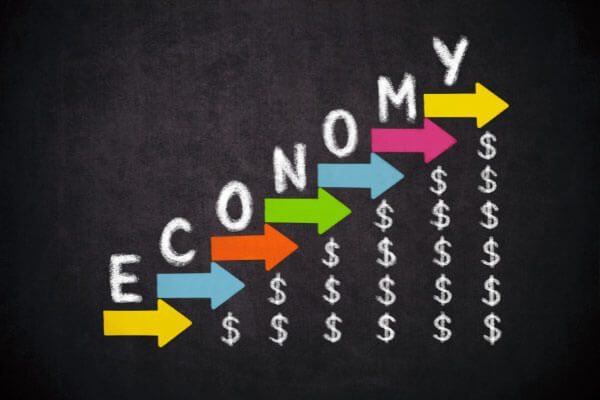
Real Estate Predictions: When the economy is going strong, people are getting hired. There are jobs, a strong stock market, increasing real estate prices, and people making money.
There is this whole thing about your primary residence that is not your asset. You made some good points that you did Airbnb, and you rent out your kitchen and all of that stuff. My husband always says, “Does that mean that my stock portfolio is not an asset? Does that mean that whatever this and that my savings account, making 0.02%?” That’s not an asset.
The thing is that all of those things are part of your net worth. It’s also depending on how are you accounting as an asset, just because it’s not making you money that you are writing off against or whatever does not mean that it’s not an asset. The big thing to remember is that instead of making somebody else rich, you are putting money towards your own future. There are a lot of cool things that you can do with that.
It’s your own. It will never be sold from underneath you, all of these things that we talked about. You can rent out a room if you need to. When I first bought my very first place, we could not afford it. We rented out a room so that we could. When we lived in Mountain View, I rented out one room. Airbnb and it paid for the mortgage and so much of our lifestyle because we were right next to Google. We were making a huge amount of money on one room. There are interesting things that you can do.
I have rented out my driveway. I’m near LA and we have a big driveway. That’s rare. They wanted to do a car commercial. I have had people want to rent our backyard for weddings, just for the ceremony, because I did not want drunk people in my yard.
Each market that you are in is going to have different things. Keep your ears and eyes open. She lives in LA and she has access to all these different things. I had lived in Silicon Valley. I have different things that people are asking for, but every place has its own little things. Each community has its things and you can take advantage of those things.
What I would want to leave with your audience is that we are in an inflationary environment. The Fed is going to try to slow that down and it will probably slow it down a little, but they are in a difficult situation where they can’t raise rates high because of the enormous amount of debt that would be impossible for the government to pay. It’s a difficult situation for the Fed to try to slow down this inflation.
What we know for sure in the housing world, in the US housing market, is that there’s not enough new supply for the amount of demand that these Millennials are creating. That’s a huge group of people that are now home-buying age. Add to it that you have got more people buying investment properties, having second homes, Airbnbs, people living longer, staying in their homes, the supply continues to diminish.
At the same time that we have got massive demand and low-interest rates, we don’t have the supply. This is going to be a problem moving forward for a while, and this is why across the US, you are seeing the same problem. Huge demand and not enough supply. If you are looking to protect yourself against this massive inflation, it’s important that you acquire real estate.
I can’t say that enough. You are going to get left behind. It’s only going to get more expensive. If you are waiting for that foreclosure crisis, you might be waiting for a while because there’s simply not enough supply. If somebody can’t make their mortgage, they are going to put it on the market. They are not going to sit around and wait for the bank to take it from them.
They are going to put it on the market and get their equity and sell it, and it will sell quickly. These foreclosures are not looking like that’s going to be an issue any time soon. If you can save your money and find parts of the US where there’s high demand, Austin, Dallas, Tampa and Jacksonville. The Southeast is the fastest-growing part of the US and homes are still cheap there, yet it’s attractive and there’s job growth.
You can still buy properties for $200,000 or less. If you want a fancy property in a class neighborhood, you pay $300,000. What are the chances that you are going to lose money on that? It’s slim. You are going to be all in around $1,200. There’s an incredible opportunity and a $200,000 house, that’s a $40,000 down payment. You do need to save your money, but if you don’t want to wait, then buy your primary because that’s only 3% down.
You have been on the show a few times and you have talked about the RealWealth Network. I want to make sure that I highlight that to my ladies. Kathy knows what she’s talking about because she helps you to buy properties all over the country or her team does. We have met Leah before on the show. She’s our own exclusive coach with RealWealth Network.
Live and learn. Listen to other people’s stories so you can learn from their mistakes.
If you want to find out more about what Kathy is talking about in these different markets, you can go to their website. The URL to remember is BlissfulInvestor.com/RealWealth. That goes directly to a page where you can sign up for a consultation. It’s free with Leah and then will also guide you to the link to go see Kathy’s amazing website, where they have so much education and all of that amazing stuff. Ladies, I want to let you know that Kathy and her team are amazing. You need to connect with them. Go to BlissfulInvestor.com/RealWealth.
Thank you so much for saying that. We have solid relationships with builders and property managers nationwide. We have known them for years and they take care of our people. They become close friends and they don’t want to let us down. I mean that sincerely. There were times in the early days of RealWealth that sometimes, they were not the highest quality, but we have learned through the years.
These relationships are solid and they set aside properties for us. You don’t have to do the bidding wars. You don’t have to fight for this stuff. They don’t raise the prices just because ten people want it, you go on the waitlist. It’s a nice relationship. A lot of them are in business. They don’t have to be. They could be retired, but they want to keep helping our members. We have a tremendous amount of trust and faith in these people.
I have been in those markets for a long time and you have these relationships, you have relationship leverage too. When things go wrong, because it’s a part of a community, they want to make things right. Not that they would not anyways.
These people would, but there are a lot who won’t. If you are one investor who’s got a property manager is taking care of you, but that got 5,000 other properties, you don’t have a strong voice, but with us, they don’t want to let us down. It’s because we have had this long-standing relationship and we have thousands of people that they take care of. They would not want to lose that business.
I loved our conversation, Kathy. Thank you.
Thank you. It’s always fun to talk to you.
Do you want to do our three Rapid-fire questions?
Let’s do it.
Tell us one super tip on getting started investing in real estate.
I know this sounds basic, but talk to a mortgage broker. We have got 3 or 4 on our website that works specifically with investors. That’s important. You don’t want to just go to your local BMA. You need to go to a mortgage broker who specializes in working with investors and find out what you can buy because you might be shocked to see that you can qualify for more than you thought.
That’s important for your audience because they are used to having to qualify for a million-dollar property, and then all of a sudden, they find out, “This is like qualifying for a car.” It’s shocking. I would say talk to a mortgage broker and see what you can do. If you are not in a position to buy it, they will tell you why, and they will give you reasons on what to work towards. That to me is one of the first things, and, of course, educating.

Real Estate Predictions: We know for sure in the housing market that there’s not enough new supply for the amount of demand that these millennials are creating.
What is one strategy on being successful in real estate investing?
The more you learn, the better. I interviewed the cutest NFL guy on my show, Devon Kennard. He’s with the Arizona Cardinals. He was darling. When he’s training for football, he’s listening to podcasts. He’s constantly learning. There’s so much free information out there.
What would you say is one daily practice that you do that contributes to your personal success?
Exercise. I have to. I carry a lot of duress from what I do. If I don’t exercise, then it gets in my body. It gets out when I go work out. Especially in nature if I can go paddleboarding, hiking or something like that.
Thank you. This has been amazing. Thanks for all that you offered in this show. That was amazing information.
Thank you so much. It’s always a pleasure.
It’s always nice to hang out.
Important Links
- Kathy Fettke
- Building a $5M Real Estate Portfolio without Stress! – Previous episode on RealWealth Show
- Retire Rich with Rentals
- CityData.com
- RealWealth Show
- Leah Collich – Previous episode
- BlissfulInvestor.com/RealWealth
- Devon Kennard – Previous episode on RealWealth Show
About Kathy Fettke
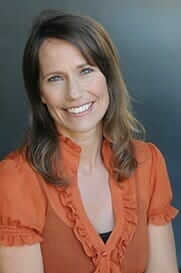 With a passion for researching and sharing the most important facts on real estate and economics, Kathy is a frequent guest expert on such media as CNN, CNBC, Fox News, NPR, CBS MarketWatch and the Wall Street Journal. She is the author of the #1 best seller, Retire Rich with Rentals, and is host of The Real Wealth Show – which is a featured podcast on iTunes with listeners in 133 different countries.
With a passion for researching and sharing the most important facts on real estate and economics, Kathy is a frequent guest expert on such media as CNN, CNBC, Fox News, NPR, CBS MarketWatch and the Wall Street Journal. She is the author of the #1 best seller, Retire Rich with Rentals, and is host of The Real Wealth Show – which is a featured podcast on iTunes with listeners in 133 different countries.
Kathy received her BA in Broadcast Communications from San Francisco State University and worked in the newsrooms of CNN, FOX, CTV and ABC-7. She’s past-president of American Women in Radio & Television.
Kathy became a certified personal coach through the Coaches Training Institute in San Rafael, California. In 2001, she took the coaching process to television and produced a cable show called “DREAM” which followed the process of 6 people going after their dreams over 90 days. Kathy noticed a theme on her Dream coaching show: most people didn’t have time for their dreams when they are spending all their time at work to make money to pay the bills.
Her show sponsor was a real estate expert and the segments they produced changed her life. After interviewing dozens of real estate millionaires, Kathy discovered their best strategies for creating passive income streams. She and her husband bought numerous investment properties and since then learned the highs and lows of investing that can only come from hands-on experience.
She is passionate about learning more and sharing that information with the members of RealWealth and the listeners of The Real Wealth Show. Kathy loves the freedom that real estate investing can bring. She is an avid traveler and enjoys hiking, rock climbing, skiing, figure skating and surfing. She lives in Malibu, California with her husband, Rich, and their two daughters.
______________________________________
To listen to the EXTRA portion of this show go to RealEstateInvestingForWomenExtra.com
To see this program in video:
Search on Roku for Real Estate Investing 4 Women or go to this link: https://blissfulinvestor.com/biroku
On YouTube go to Real Estate Investing for Women
Moneeka Sawyer is often described as one of the most blissful people you will ever meet. She has been investing in Real Estate for over 20 years, so has been through all the different cycles of the market. Still, she has turned $10,000 into over $5,000,000, working only 5-10 hours per MONTH with very little stress.
While building her multi-million dollar business, she has traveled to over 55 countries, dances every single day, supports causes that are important to her, and spends lots of time with her husband of over 20 years.
She is the international best-selling author of the multiple award-winning books “Choose Bliss: The Power and Practice of Joy and Contentment” and “Real Estate Investing for Women: Expert Conversations to Increase Wealth and Happiness the Blissful Way.”
Moneeka has been featured on stages including Carnegie Hall and Nasdaq, radio, podcasts such as Achieve Your Goals with Hal Elrod, and TV stations including ABC, CBS, FOX, and the CW, impacting over 150 million people.
Can Money Buy Happiness With Hal Elrod – Real Estate For Women

Can money buy you happiness? People need money to operate. There are a lot of important things you need to do but without money, you can’t do it. How can you find true happiness in your life? Learn more with Hal Elrod and Moneeka Sawyer as they talk all about bliss. Discover how to be blissful at the moment. Find out whether money is the root of all evil. And, know more about Moneeka’s book Choose Bliss. Listen to this episode and understand how to be confident in anything you do.
—
Watch the episode here
Listen to the podcast here
Can Money Buy Happiness With Hal Elrod
Real Estate Investing For Women
Welcome to February of 2022. How has this year been going for you so far? I felt blissful in this transition from 2021 to 2022. I feel like there has been this slow roll into the new year. Normally, the new year feels frenzy to me. There’s a lot of that masculine go-getter energy that we get. I love the go-getter energy. That’s not a criticism. It feels a bit spastic and forced in the new year. There’s a random date that people feel they have suddenly got to get all these new year’s resolutions and do all this new stuff. It’s not realistic. It’s not based on what their true ambitions are. It’s this contrived idea of who we are supposed to be in the new year.
I have been trying not to do that over the many past years. What is interesting is that if we have that global energy, we all get swept in it too. Whether we in our own lives do it or not, that energy is still there. It impacts and influences us. What is fun this year is that I have felt the slow, gentle flow, like the flow of a river into this new year. I loved it. Surprisingly, I feel like I have been more productive in January of this year than ever before because it feels so natural like it’s where I’m supposed to be. I hope that you guys are feeling that same energy. I’m feeling that globally. I hope you are feeling it too. I hope that so far, your year has been amazing.
As we move forward, I wanted to share with you a show that I did a while ago with Hal Elrod. He is the author of The Miracle Morning. I know many of you love that episode. I got great responses. I was also on his show and we talked about, “Can money buy happiness?” which is the ultimate question I get all the time. People are like, “Moneeka, do you think that money can buy you bliss?” I have got all sorts of responses to that.
I thought it might be fun for you to read Hal and I talk about this and our meeting of minds on this and also the places where we don’t necessarily agree. It was a great conversation. Hal’s podcast is called Achieve Your Goals. I thought it was appropriate to be talking about goals and how money impacts those goals early in the year as we are moving into this year. I hope you enjoy this show as much as I enjoy doing it. Hal is fascinating. I love him and I hope you love him too. Enjoy the show.
—
In the show, we interview successful individuals. Success and successful are two words that are loaded words. I want you to define what success is for you. Is it happiness, health, financial freedom, the impact you make in the world, the legacy you leave or all of the above? For me, success is all of the above and then more that I didn’t even mention. We are going to approach success in a different way. If I was summing it up in one word, success in the context of this conversation that you are about to read with Moneeka Sawyer, in one word, success is bliss.
Moneeka Sawyer is often described as one of the most blissful people you will ever meet. She is a real estate investor. That is her profession and trade. She has been doing that for many years. In the last couple of years, as you can imagine, if you have paid attention to the real estate market, I know mine when it crashed in 2008. That was the lowest point in my life where The Miracle Morning was born from that adversity. She has seen it all. She has been through all the different cycles of the market. She turned $10,000 that she started with into over $2 million. It’s part of the bliss for her. She is working only 5 to 10 hours per month with very little stress. We will talk more about this.
I always say, “In life, you can be stressed out or blissed out.” I say that from the stage all the time. I also say, “It has nothing to do or very little to do with what is going on around you and everything to do with what is going on inside of you.” While Moneeka was building her multimillion-dollar business, she has traveled to over 55 countries. She dances every single day. It’s part of her bliss. She has spent lots of time with her husband for many years.
She is also the international bestselling author of the multiple-award-winning book, Choose Bliss: The Power and Practice of Joy and Contentment. She is the Host of the show Real Estate Investing For Women. I was on her show and she laughs a lot. She is happy and healthy. She has been featured on stages, radio, podcasts and TV stations, including ABC, CBS, Fox and The CW, impacting over 100 million people. We are going to make it 101 million-plus people as you read this show. Moneeka, welcome to the show.
Hal, thank you so much for having me.
In life, you can be stressed out or blissed out and it has more to do with what’s inside you than around you.
You are welcome. It’s a pleasure. I was on your show a while back. Occasionally, I’m on a show and I love the energy so much of the host that I go, “Will you come on my show? Will you bring that laugh, bliss and message that you have to the Achieve Your Goals readers?” I’m grateful that you are here. It’s a word list that is so rich with meaning. I want to ask you for your definition. A lot of people ask me when I’m on their show, “How do you define a miracle? That’s a loaded word.” Bliss is a mysterious word and maybe loaded. What is bliss as you define it, Moneeka?
Bliss is not just being happy. It’s a much deeper sense of joy, contentment and absolute confidence that you can handle anything that comes your way. It’s all about emotional mastery and emotional resilience. This is one of the things we connected on also on my show. I always say, “You can’t control what happens on the outside but you must control what happens on the inside.”
It sounds like you and I are pretty like-minded. I like that. They say there are no new ideas. I have been studying metaphysics a lot lately. I have been studying the collective field of consciousness. It’s interesting that I often will talk to somebody like you or read a book. I’m sure you experienced this when you were reading something. You have an idea that you feel is an original idea that you have never heard of and then you realize, “That was in Think and Grow Rich 100 years ago. That was in the Bible.”
It’s the collective field of consciousness of intelligence that we can all tap into if we want to. Bliss is happiness and joy. You talked about emotional resilience and emotional mastery and what happens inside of you versus what happens outside of you. It’s that old phrase, “They practically wrote the book on this. No, you wrote the book on this.” You wrote the book, Choose Bliss. How did you come to this idea of bliss?
I was born in a part of America where I was the only person in school that was not White. Due to that, as a young girl, I was bullied, humiliated and tormented constantly. I learned early in life that life was hard, that people weren’t going to like me and that I was all alone. You can imagine that’s not a blissful or happy place to be. As I grew up, the torment became much worse. It got violent and there were some horrible things that happened that boys do to girls.
After all of that, I was in a car accident where I was sitting at a red light. A guy was going 50 miles an hour and smacked me from behind. I became a cripple and was told that I was never going to walk again. That’s not horrifying enough but what you don’t know is that I had been dancing since I was three years old. My deepest dream was to become a professional dancer and now here I was with no legs.
I know that you can relate to this story. I went through this period of, “I’m not going to be in a chair. I’m not just going to walk again. I’m going to dance and compete again.” I went after it. I saw the right doctors. This was in the years when there was no real holistic healing. I still would see a chiropractor, acupuncturist and all these healers but it never got better.
What age was the accident?
I was 21. Things weren’t getting better. The pain was still completely overwhelming. As I realized that things were not getting better about a year in, I started to feel hopeless like, “I can’t see the light at the end of the tunnel. It’s not getting better. I’m not able to find my path.” I started to fall into a very deep depression. I remember it had been about a year of me sinking down this hole where I was still in so much pain. One day, I had been in bed for about a week and crying. I had the covers pulled over my head. I don’t know if anybody else can relate to this. I’m so depressed.

Can Money Buy Happiness: Bliss is not just being happy. It’s a much deeper sense of joy and contentment. It’s the absolute confidence that you can handle anything that comes your way.
I woke up this one morning and heard my mom’s voice in my head. She said, “Get out of bed and go get some air. You will feel better.” I said, “Thanks, mom.” I pushed the covers off my head and swung my legs around to get out of bed. As I tried to stand up, I fell to the ground because my legs were too weak to hold me. I sat there on the ground. I pushed myself up against my bed and cried. At that moment, I prayed and said, “God, it never gets better. It keeps getting worse and I can’t keep going this way. Have mercy on me. Either take me home or teach me how to live.”
About an hour later, a girlfriend who I had not heard from for over two years randomly called. She was the answer to my prayer to God. She asked me how I was doing and turned me on to a coach named Ted. Ted saved my life. As we started chatting, he reminded me of my tenacity and strength. He reminded me of my constant search for happiness and all the things that I had learned. He added some of his own new skills and together we brought me back. It was amazing.
You make a decision to live and be blissful but then you have to go through the journey to get there. It was not an easy journey but once the decision was made, I went for it. I started to experience life in a way I had never experienced before with so much joy and bliss, where before I thought, “Happiness is so fleeting. It was dependent on if I had no pain or if someone I loved was near me or if I had the right things or was around the right people.” In those days, I thought happiness was fleeting. Now, I could see that bliss was about what was going on inside of my mind, heart and soul.
Ted was so excited about my recovery. He hired me on as a bliss mentor underneath him as a coach and I started dealing with his executive clients. It was funny because I would talk to these guys. They are super successful. How do we define success? I know there are lots of different definitions. They had tons of money, the perfect house, perfect marriage, cute kids, an adorable dog, a white picket fence and a nice car. They had it all. As we talked about why their business was failing, what we found is that they were no longer happy. They were not motivated, inspired and creative.
I took my lifelong journey and all the skills I had developed and what Ted taught me. I started to teach these amazingly successful men how to find joy again. That’s how I came to bliss and moved into my work. That’s why I wrote my book because the thing about coaching is I can only reach people one-on-one. Speaking in groups, I can only reach so many people but a book can and has reached millions of people to create bliss around the world.
I don’t know if I’m the male version of you or you are the female version of me.
I have that same feeling. It was amazing.
Coaching can only reach people, one-on-one or in groups. But a book can reach millions and millions of people.
In an accident, I did some inner work. I discovered a better way to live free from emotional pain and be blissed out, happy and grateful. Authentically, it’s all of those things and then the feeling of responsibility, “How we could impact the world is to put it in a book.” I wrote The Miracle Morning. You wrote Choose Bliss. I’m getting chills at how aligned our stories are. It’s two souls that are on a similar journey. It’s very cool.
Let’s start with this and get actionable. I’m only practical and actionable. Too many teachers, messengers, authors and whoever are very philosophical. They teach you philosophy, which can be helpful but if it’s not actionable, you don’t change your behavior. You often forget the philosophy or life gets in the way of the philosophy or your emotions get in the way of the philosophy. With all that said, give us one tip that we can use to be more blissful.
This is my favorite tip to give people because it’s actionable and usable even as you are sitting with me. Maybe you are driving a car and then suddenly someone cuts you off. You get irritated. You can feel this emotion happening. This can happen in lots of cases whether it’s at work or you got cut off. I’m going to use the cutoff one because a lot of us can relate to that. When you are in a moment where you are not blissful and you are the opposite of blissful, you can create a bliss moment.
This is what you do. Someone cut you off in traffic, let’s say. All of a sudden, you are upset. Why are you upset? It’s not because of what happened. It’s the meaning that you give that. Suddenly, a story happens in your mind about, “I can’t believe they cut me off. What if they had hit me?” All of these stories happen in your mind. That’s what causes the stress.
This is how you do a bliss moment. You stop those stories in your mind and do a complete interrupt. For me, I will say, “Moneeka, stop.” I literally interrupt the thought and then I drop into my body, roll my shoulders back a little bit, relax my body and take a couple of deep breaths. Now, you are in a place of being grounded, centered and compassionate. You can approach your life with whatever decision or situation. Whatever you are doing, you can approach that situation from this place of heartfelt bliss.
Let’s say something happens. Somebody cuts you off and you are upset about it. I’m following your process. I interrupt the thought, “Hal, knock it off. This is not productive. Being upset is not going to fix it. There’s no point in being upset. Take that deep breath and get centered in the body.” What if the mind is not obeying? One thing is we are programmed. You can study at a neurological level that there are pathways in the brain. Our brain fires off the same way it fired off last time somebody cut us off in traffic. We keep living our life on repeat.
If somebody does that and they interrupt the pattern, they get into the body and get centered through breath and relaxing the shoulders but they still feel that emotion coming up. Is there any self-talk? Is there more physical work? For me, what you are saying is you are preaching to the choir. If somebody is reading that’s like, “That sounds easier said than done,” that’s what I’m thinking. What would you say to that person? How would they implement this?
First of all, it is hard because we are hardwired to act a different way. It may not work the first time. The first thing that I will say to you is to keep practicing because practice will make perfect. It may not help the first time but once you practice it ten times, you will start to see it. Maybe it’s not even ten. Maybe it’s 1, 2 or 3. You will start to see, “It is having an impact.” If it was easy, everybody would be blissful. We have to focus on this and make it a priority. It’s not always easy. Anything worth having sometimes you have to work for. It’s okay if it does not work the first time.

Can Money Buy Happiness: To create a blissful moment, you need to stop those stories in your mind. Then drop into your body, roll your shoulders, take a couple of deep breaths, and relax.
Here are some things. First of all, don’t beat yourself up because it did not work. Like just know, “I need to get better at this.” You practice it again next time. You can turn this into a game. Start looking for those moments that you can utilize this technique so you can practice it so that it starts to build the neural pathways in your brain of how you react like, “I’m upset about that.” Here’s another natural thing that people are like, “I’m upset and I deserve to be upset. That was wrong.” You do have a right to be upset. How does that make you feel and perform? Is that what you want in your life even if you have a right to it? Is it useful? Is it going to make you blissful?
I want to follow up on that. We teach a similar lesson. Truth is truth, especially if you have been through what you and I have been through and the car accident being told you are not going to walk again. Either you let that destroy you emotionally and you become the victim or you rise above it and you learn how to manage your emotions in such a way that adversities don’t deter you in a major way. For me, I teach what I call the Five-Minute Rule, which says, “It’s okay to be negative when something goes unexpected or not according to plan or it’s painful or difficult.”
Set your timer on your phone for five minutes. You get five minutes to bitch, moan, complain, cry, vent or punch a wall. I’m going to say the same thing, “Get into your body and take a deep breath.” You say three liberating words, which are, “Can’t change it.” It’s not that you can’t change the future. It’s that you can’t change the past. That already happened. You can’t change it.
When I learned this, I was nineteen. It was in my sales training. I shared this with audiences because I go, “Raise your hand if you think five minutes is not quite long enough. You need at least a Five-Hour Rule or maybe five days to be pissed off.” A lot of hands go up. They were like, “Come on, five minutes? I’m starting to get upset at five minutes. I’m barely scratching. I’m just getting riled up. My face isn’t even as right as it’s going to be in about ten more minutes.”
That’s the thing. When I learned this, I thought five minutes was not enough and I needed longer. Sure enough, the first time I had a customer cancel an order, it was my biggest order of the week. It was the last day. It helped me hit my goal and now I failed my goal because I lost the order. I set the timer for five minutes. The timer went off five minutes later. This was a week into my sales career. I’m so mad and the timer goes off. I’m ready to throw the phone. I go, “I’m still mad because five minutes went by. I’m still upset.”
It was probably a few days in. It was maybe after a week. I don’t remember the exact day but here’s what happened. It creates what you are talking about. This is conscious awareness. Either you are reactive or proactive in terms of the meaning that you are giving to the things in your life that are not pleasant, desirable or you did not expect or want. The idea is that when the timer would go off the first few times, it was not enough time. Each time, I was being consciously aware, “There’s no point in dwelling on something I can’t change. There’s no point in staying upset.” You can be stressed out or blissed out. It doesn’t matter what is happening to you. As Moneeka said, you give it to it and you respond.
There’s no point in dwelling on something you can’t change. There’s no point in staying upset.
What happened is I can picture the moment. I was in my apartment. I had another woman cancel an order. It was the last day toward my goal. I set the timer for five minutes. I got up and I was like, “I can’t believe she canceled that order. I needed this so bad. I have no time to make up for this.” I picked my phone back up and I had 4 minutes and 32 seconds. I went, “What is the point of me being upset for another four and a half minutes? I could turn the timer off and say, can’t change it, accept it, be at peace with it and schedule more appointments. That seems like a better use of my time and energy.”
The Five-Minute Rule, within a matter of a week, turned into the Five-Second Rule where I’m like, “I need to vent for a second. There’s no point in changing it.” I love what you are saying. I played that devil’s advocate of like, “What if you do that? You interrupt your thought pattern, get centered in your body, relax the shoulder, take a deep breath and then give yourself permission to feel that bliss. What if you are still upset?” For me, that was it.
After a matter of days or a week or so, I realized I was reconditioning the meaning that I have been giving to adversity my entire life, realizing, “I’m not a victim. It’s not a life sentence that whenever something happens that I did not want to happen, I have to be upset about it until I forget about it.” Anytime they think about something, it makes them upset. They get upset whether it happened five days, five months or five decades ago.
People do carry it for five decades. It’s still there for you. It’s like, “Is that still serving you?” I asked you to be on my show because I listened to some of yours. I love this Five-Minute Rule thing because one of the things that I used to say is, “You do have a right to your emotions.” Like you say, truth is truth and sometimes things suck. That’s the truth. Give yourself a time limit where you get to honor your feelings. You get to honor them, live them and be them. Commit to yourself that you will turn it off and commit to your own happiness again in order to move forward.
For me, I left it for people to look inside at what that time limit is whether it’s a day, an hour or a couple of days. If someone dies, maybe you want a month. I love the way you took it from this pick to, “Try this. Just do this.” If something horrible happens, you may still be there for a while. You may still be there for a month. If your intention is to only be there for five minutes, you are so much more likely to succeed at getting back to bliss than if you will not have that intention to get back there in a timely fashion.
The thing is you might as well choose bliss in the midst of your adversity. That’s the difference. People think it’s mutually exclusive like, “I feel bad because bad things happen.” You feel bad because you are not willing to give yourself the gift of acceptance and being at peace with the “bad thing” that happened.
When you talked about can’t change it, the motto that I have used is, “I am at complete peace with exactly how my life is today.” That’s always my motto.
You believe wealth is important to bliss. I do as well. I would love to hear why you think that is.
It has been scientifically proven that people that struggle with money are not happy. It has also been statistically proven that once we can pay the bills and we are comfortable, we tend to be happier. What happens in the world now, especially in our business world is so many people are out there with a real message. They are just not out there to make money. I’m sure that this is true with many of your readers. They are out there to change something and do something important.

Can Money Buy Happiness: Money causes a lot of divorces. It’s the stress of not being able to provide for your family. But you don’t need to be rich, you just need to be able to provide for yourself and the necessities of life.
The honest truth is, it’s hard to do things that are important if you are broke. You need to have wealth supporting you, creating your foundation and taking care of you so it’s not taking up your mind real estate so that your mind real estate can be focused on your passion. It’s the things that you want to do in the world. It’s your message. The more wealth you have, the more good you can do. To the point where you are paying the bills and surviving, it’s going to affect your actual happiness and bliss. Creating more wealth does help to support you in creating more bliss in your own life because it allows you to be authentically who you want to be in the world in the biggest way possible.
One of my mentors used to say, “Money is not the root of all evil. It does not make you a bad person. It makes you more of what you are. It’s the grand amplifier.” If you are a good person, money is a tool for you to do more good in the world. If you are a jerk, money is a tool for you to be a bigger jerk.
That’s why I focus so much on bliss because I want people to experience bliss through that journey. Who they become as they are building wealth is who they get to be when they are wealthy. That’s who they amplify in the world. We are so aligned on that because you don’t want to be amplifying the parts of you that are not the most beautiful parts. As a blissful person, you can amplify that bliss through your work in the world. That’s the important thing.
There’s a very cliché saying that money can’t buy happiness. Would you agree with that? Would you say that money does buy happiness?
It does buy happiness in the way that I talked about. For people who are broke, it’s a lot harder to be happy. Let me qualify this. I don’t believe that we have to be rich or be at the mercy of everything around us to be happy. We have already talked about that. What I will say is that being in pain makes it more difficult to be blissful. It’s harder work. If you are physically, emotionally or financially in pain, you are going to have a harder time finding happiness. It doesn’t mean it’s impossible. It means that it’s less probable.
You put it out there, which studies show it’s proven. Here’s one context of many. What is the number one cause of divorce? It’s money problems. It’s the stress of not being able to put food on the table, put the roof over your head or pay your bills. It’s the stress that it causes. In the context of a marriage, it breaks the marriage. I like that you said that. You are not saying that you need to be rich but it’s being able to provide for yourself and the necessities of life.
The beauty of it is if you want to live off the land, you might not need any money. It’s almost like you could say it’s resources that you need. You need resources to support your lifestyle. For most of us, money is one of those resources. If you live off the land, hunt your food, live in a hut and don’t have any property taxes, you don’t need money but you do need resources.
What about your future? If you live off the land but you don’t want your children to have to live off the land. You want to send them to college. Money becomes important again. I don’t know whether it’s fortunate or unfortunate but money is our transactional way of creating life and it creates our future. It creates our possibilities. Having it at your disposal gives you more options, possibilities and opportunities.
It does all of those things. It’s the freedom to do what you want with the money that you have. One of my best friends and my business partner is Jon Berghoff. He is wise beyond his years. He is younger than I am. He was in his twenties when he said, “Money is just energy. If you want to put that energy toward providing water for people that don’t have water, that’s what money allows you to do or food for people that don’t have food. They don’t have the means to earn their own food because of maybe the culture that they live in, where it’s not a capitalistic culture. They can’t go out there and earn their own money. Their hands are tied.”
Money is not the root of all evil. It makes you more of what you are. It’s the grand amplifier.
Whether it’s good or bad, right or wrong, I have mixed opinions. In capitalism in some ways. It’s another conversation. Part of me is like, “We should get further back and regress to primal times where we are living off the land. We are not competing for who has the biggest car or all of those things.” I might write a book that they called prehistoric parenting, getting back to what works or something like that. The point is the reality is the culture that we do live in. If somebody is sick, they have bills.
I have a friend. She is a single mom and she has cancer. It’s so sad. She was a teacher and the school let her go because of her appearance. She had lost all her hair and a lot of weight. The parents were afraid of saying their kids were afraid of her. She is the sweetest and most selfless human being on the planet. She almost dedicated her life to being an underpaid teacher. She was trying to teach between her chemo treatments. They had to let her go because the parents were frightened by her appearance.
Her hospital bills are $12,000 a month. She can’t support herself and she has no help. I’m paying her bills. It’s like, “Is money bad? Is money the root of all evil? Does it allow you to help people who are in need of that help and support?” We belabored that point. I read a great book years ago called The Soul of Money. I talked a lot about that. There’s the idea that money is not bad. It’s what you do with it. It can be one of the most beautiful things in the world.
What meaning are you giving to it? You have control over that.
What is your book Choose Bliss about? We have a general idea but I would love to hear how you explain it. Where is the best place to get it?
I was an executive coach for over a decade and I tried a lot of different strategies. There were strategies that worked well for me. There were strategies that worked for every one of my clients. I compiled all of those strategies into my book, Choose Bliss. Guess what the first one is? Create your date with your morning routine.
I was going to say it’s got to be the morning ritual.
It would be some morning routine. It’s another way that we are totally aligned. That’s what Choose Bliss is. It’s written as my story so you get to know who I am and where I’m coming from. There are a lot of good actionable strategies because I’m like you. The theory is awesome. It does not get the job done. You need to get the job done. Bliss is about taking action. That’s what the book is about.
Is it safe to say that if you love The Miracle Morning, you are going to love Choose Bliss?
I absolutely think so. I think we are totally aligned.
Moneeka, you are blissful to talk to. Your energy comes through in your voice and laugh. You have such great energy. I’m very sensitive and in tune. I feel like with people’s energy and yours is blissful. Thank you for doing what you are doing in the world and sharing your bliss with our readers. Where can people learn more from you and about you? Tell me the name of the show again. I know you have a website. Where can people follow and keep up with you?
Choose Bliss is available on Amazon. That’s the one place. You can go to BlissfulInvestor.com to find out more about me and what my philosophy is about wealth. The show is Real Estate Investing For Women. I know that it’s real-estate-focused but it’s a very holistic approach to wealth. We talk about mindset, heart set, strategies and money smart. It’s the whole picture of creating success.
I will give a little tangent soapbox. You may have heard me say this before or you may not have. I’m a big believer in passive income. That’s a word that can sometimes even be a cringe word where you go like, “Get-rich-quick and create passive income.” When I was in the hospital fighting cancer, I had passive income from the thirteen books I had written and the 30-some translations of The Miracle Morning. Every single one of those, I got checks all year long and it supported my family.
I truly believe that’s one of the most important things that you can do if you live in our society, where you need income to put the roof over your head and buy your food if you are not living on the land, which is probably 99.9% give or take of our readers. Creating passive income is what I like, Moneeka. We did not focus on that. Go to Moneeka’s website. It’s for women but I would imagine men could probably implement the same investing strategies. I don’t think that it’s like, “You are a man. These won’t work for you.” It’s investing in real estate unless you are going to be an author.
The thing about writing books and making money off your books is it’s much harder. I’m very blessed, fortunate and lucky that my books have generated significant income because it’s not common. It’s harder to duplicate. When I’m coaching clients or talking to friends, they are like, “How do I create passive income? Should I write books?” One of my best friends in the whole world is Matt Recore. He is already retired at 35 by investing in real estate. He is still going.
It truly is the easiest way to create wealth and passive income.
My other best friend is David Osborn. His net worth is $100 million and it’s all from real estate investing. In terms of bliss, wealth is a big part of that financial freedom. You don’t have to be rich but financial freedom does bring such a quality of life where you are not stressed about it. Check out Moneeka’s stuff at BlissfulInvestor.com and the Real Estate Investing For Women Show. Check out the book on Amazon, Choose Bliss: The Power and Practice of Joy and Contentment.
If you do want to join me in person for 2 to 3 life-changing days, I’m going to start talking more about this because we are getting into the time where it’s time to start looking. Tickets are on sale for the Best Year Ever Blueprint Live Experience. You can check that out at BestYearEverLive.com. This is our sixth year and we have 350 spots. They are already spoken for but that means there are about 100 tickets available. You can check that out. I would love to spend a few days with you on December 13 through 15 in sunny San Diego, California. Moneeka, thank you for being on the show. I appreciate you.
Thank you so much for having me. This was amazing.
I enjoyed our conversation. Goal Achievers, I hope you enjoyed it as much as I did. Until next time, go out there and achieve your biggest goals and dreams because you absolutely deserve nothing less. I love and appreciate you. I will talk to you soon. Take care.
Important Links
- The Miracle Morning
- Achieve Your Goals – Apple Podcasts
- Choose Bliss: The Power and Practice of Joy and Contentment
- Real Estate Investing For Women
- Think and Grow Rich
- The Soul of Money
- BlissfulInvestor.com
- BestYearEverLive.com
About Hal Elrod
 Hal Elrod is on a mission to elevate the consciousness of humanity, one morning at a time. As one of the highest rated keynote speakers in America, creator of one of the fastest growing and most engaged online communities in existence and author of one of the highest rated, best-selling books in the world, The Miracle Morning—which has been translated into 27 languages, has over 2,000 five-star Amazon reviews and is practiced daily by over 500,000 people in 70+ countries—he is doing exactly that.
Hal Elrod is on a mission to elevate the consciousness of humanity, one morning at a time. As one of the highest rated keynote speakers in America, creator of one of the fastest growing and most engaged online communities in existence and author of one of the highest rated, best-selling books in the world, The Miracle Morning—which has been translated into 27 languages, has over 2,000 five-star Amazon reviews and is practiced daily by over 500,000 people in 70+ countries—he is doing exactly that.
Hal actually died at age 20. Hit head-on by a drunk driver at 70 miles per hour, his heart stopped for 6 minutes, broke 11 bones, and eventually woke from a coma to be told by doctors that he would never walk again. Not only did Hal walk, he went on to run a (52 mile) ultra-marathon and become a hall of fame business achiever—before the age of 30. Then, in November of 2016, Hal nearly died again—his kidneys, lungs, and heart on the verge of failing, which led to his being diagnosed with a very rare, very aggressive form of cancer (acute lymphoblastic leukemia).
After enduring the most difficult year of his life, Hal is now cancer-free and furthering his mission as the Executive Producer of The Miracle Morning Movie—a documentary that both shows you the morning rituals of some of the world’s most successful people, as well as takes you around the world to show you the life-changing impact that Miracle Mornings are having, globally.
Hal is also host of the highly acclaimed Achieve Your Goals podcast, creator of the Best Year Ever Blueprint Live Experience, and bestselling author of ten [10] books in The Miracle Morning book series.
As one of the most inspiring, highly entertaining (we’re talking “wannabe stand-up comedian” level humor!), and one of the most in-demand keynote speakers in the world, whether you are an individual or an organization, Hal will give you the tools to Wake Up to Your Full Potential.
______________________________________
To listen to the EXTRA portion of this show go to RealEstateInvestingForWomenExtra.com
To see this program in video:
Search on Roku for Real Estate Investing 4 Women or go to this link: https://blissfulinvestor.com/biroku
On YouTube go to Real Estate Investing for Women
Moneeka Sawyer is often described as one of the most blissful people you will ever meet. She has been investing in Real Estate for over 20 years, so has been through all the different cycles of the market. Still, she has turned $10,000 into over $5,000,000, working only 5-10 hours per MONTH with very little stress.
While building her multi-million dollar business, she has traveled to over 55 countries, dances every single day, supports causes that are important to her, and spends lots of time with her husband of over 20 years.
She is the international best-selling author of the multiple award-winning books “Choose Bliss: The Power and Practice of Joy and Contentment” and “Real Estate Investing for Women: Expert Conversations to Increase Wealth and Happiness the Blissful Way.”
Moneeka has been featured on stages including Carnegie Hall and Nasdaq, radio, podcasts such as Achieve Your Goals with Hal Elrod, and TV stations including ABC, CBS, FOX, and the CW, impacting over 150 million people.

